| |||||||
| Search Forums |
| Advanced Search |
| Go to Page... |
 |
| Search this Thread |  17,975 views |
| | #1 |
| Distinguished - BHPian  Join Date: Apr 2010 Location: Bangalore/Pune
Posts: 1,913
Thanked: 20,649 Times
| Cars, Wildlife and Photography Lessons at Kabini Cars, Wildlife and Photography Lessons at Kabini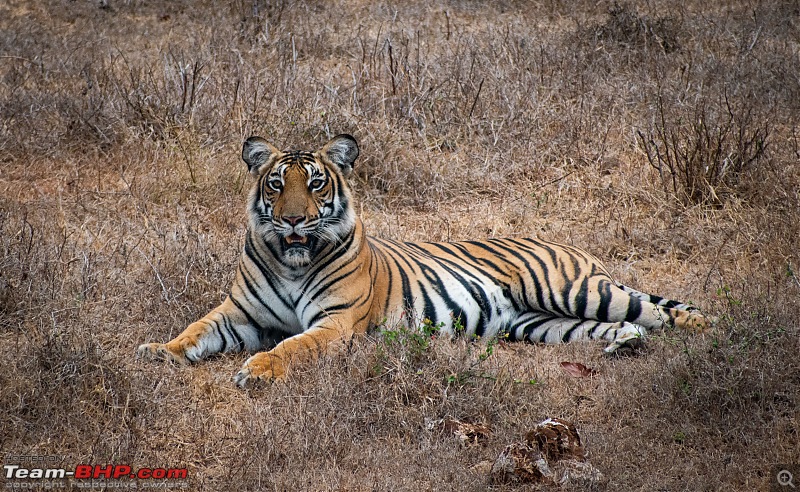 I am used to "road trips photography". But taking a photo like this was a totally new experience. And I loved it! I love cars and I love photographing them. I also love road trips and photographing landscapes and nature through these road trips. I have been posting those type of photos in my previous travelogues (for example: https://www.team-bhp.com/forum/trave...dows-down.html (Chikmagalur: Driving through Coffee Country, with the windows down)). However, I never had any exposure to wildlife photography. Car photography is relatively easy. Just take your car out on a drive (and call your friends too if you would like to photograph more cars than just your car), find a decent location, you can even choose the foreground and background as you like, quickly go to your usual camera settings, and start shooting. Easy enough for a lazy person like me. But wildlife photography is much harder. To begin with, you need to find the wildlife to photograph them. That means you need to go to some forest, and then take multiple safaris there, and even after that, unless you are lucky, you may not see anything special. Not the same as shooting cars on a causal Sunday drive. Further, even technically, wildlife photography is quite challenging. When I shoot landscapes or stationary cars, I already know what camera setting to use for the typical shots. The scene is static. I can take my time to choose the best settings, and once chosen I can leave it there for most of the times. However, none of this applies to wildlife photography. Wildlife scenes in the forest are dynamic, and speed and timing are of utmost importance. You often shoot at the dawn or the dusk, which means challenging lighting conditions as well. If you happen to spot something interesting, the subject will be at some arbitrary distance (as opposed to your own car which you can park at a specific location and you can walk to the desired distance), and one has to be quick to readjust the aperture for every shot to get the appropriate depth of field. Further, you need a good telephoto lens for wildlife. A good quality 50mm prime which is light enough to carry around would work great for shooting cars, but definitely not for shooting a tiger if you see one say at a 100m distance in your jungle safari. There you need at least about a 400mm lens. All this was (and still is) new to me. Thanks to a lot of random readings on the net and some online courses in photography (which is again easy enough even for a lazy person like me), I knew this in theory and had a decent theoretical knowledge of some of the technical aspects. But what I never had was a practical, hands-on session with an expert, in person. I never had an opportunity to shoot together with an expert. I never had an opportunity to watch what the expert does and learn from the expert's methods. I never had an opportunity to compare my photo directly with a photo taken by an expert, of the same scene. This trip gave me exactly that opportunity, and I loved it to the bits. This happened thanks to my close friend bhpian robimahanta (I will just refer to him henceforth as “Robi”, just like we do in real life) who is an expert photographer with tons of experience in wildlife photography and photography in general. He has taken some stunning wildlife photos in the past. And Robi is close friends with a very well-known name in wildlife photography, Jayanth Sharma (https://www.instagram.com/jayanth_sharma/?hl=en). Jayanth Sharma is a famous wildlife photographer, and his company, Toehold Travel & Photography (https://www.toehold.in/) organizes specialized photography tours and other specialty experiences. (Disclaimer: I have no connection with Jayanth Sharma or with this company whatsoever. Mentioning this here merely to give a context to the readers about who he is). And one fine day, when we were just chilling out in Bangalore with some friends, a plot got hatched up that we would go to Kabini with Jayanth and take a few photography lessons and also do some wildlife photography. This sounded like a real godsend for someone like me who always wanted to learn from the experts, and always wanted to experience the intriguing world of wildlife photography. Both I and my wife agreed to this plan on the spot! There was one more family with us in the original plan, but unfortunately, due to circumstances beyond anyone's control, they had to drop out of this trip in the last minute. Although wildlife was the central theme, this trip was not only about wildlife photography. It was much more than that. As I mentioned, shooting our cars and convoy photos is my old hobby. Those who have been following the threads about new car launches in India would already know that Robi has recently bought a BMW M340i, in sunset orange – the hottest new car in India at this moment. That car looks stunning in person as well as in pictures, and photographing that was something I was eagerly looking forward too. And of course, I had my beloved BMW 320d that would follow and try to keep up with the M340i on the roads. Thus, a car photoshoot was always on the agenda, and a couple of sessions were planned for that too. The rest of the travelogue is organized into following sections: 1. Reaching Kabini River Lodge 2. Jungle Safaris and Landscapes 3. Wildlife Sightings and Photos 4. Car Photoshoots 5. Learning through examples (I will do a comparison between a couple of photos taken by me and the same photos taken by Robi/Jayanth and I will present my learning) 6. Expert photos: I would request Robi to add his photos too with his own comments Finally, before moving on, let me mention what camera I was using. I have only a basic DSLR setup with kit lenses: Nikon D3500 with Nikon 18-55mm f/3.5-5.6VR and Nikon 70-300mm f4.5-6.3VR lenses (The camera has APS-C sensor, and thus with APS-C crop factor of 1.5, that 300mm becomes effectively 450mm). Most of the photos posted below are taken with this camera, but a few were taken with my mobile phone as well (the en-route car photos were taken by mobile phones). Of course, Robi and Jayanth both had quite advanced equipment, but again, it was their skill level that was more important than the equipment, and when we discuss their photos in the end, the discussion would be about photographer’s skills than the equipment. Last edited by Dr.AD : 4th April 2021 at 13:53. |
| |  (36)
Thanks (36)
Thanks
 |
| The following 36 BHPians Thank Dr.AD for this useful post: | Abhinav V, abirnale, arun_josie, Bhalla, Bibendum90949, BlackPearl, CEF_Beasts, FlashMustang, Gamerk, Gannu_1, graaja, GTO, GutsyGibbon, haisaikat, hondafanboy, InControl, JTM, KarthikK, kung_foo_fanta, mankuthimma, megazoid, paragsachania, PearlJam, procrj, R2D2, rahulananda, RBalaM, SnS_12, sparky@home, Stryker, Thermodynamics, vb-saan, Venkygupta, Vik0728, vredesbyrd, ysjoy |
| |
| | #2 |
| Distinguished - BHPian  Join Date: Apr 2010 Location: Bangalore/Pune
Posts: 1,913
Thanked: 20,649 Times
| Re: Cars, Wildlife and Photography Lessons at Kabini Reaching Kabini River LodgeOur destination was JLR Kabini River Lodge (https://www.junglelodges.com/resort/kabini-river-lodge/) which is about 5 hours drive from Bangalore. This is a simple and easy drive, with nothing much to discuss. However, the Bangalore-Mysore section is notorious for heavy traffic and significant delays while crossing the towns on the way. As if the old traffic delays were not enough, there is now further delay due to major road construction (making a new wider highway) happening in this section now. These conditions make this Bangalore-Mysore section one of the most dreaded sections while traveling out from Bangalore. Therefore, this time I decided to check out a significantly longer, but much more peaceful and enjoyable routes. I drove from Bangalore to Mysore via NH75 to Bellur Cross and then via Pandavpura to Mysore. This section is shown in the map below. The longer, but much more enjoyable detour from Bangalore to Mysore: 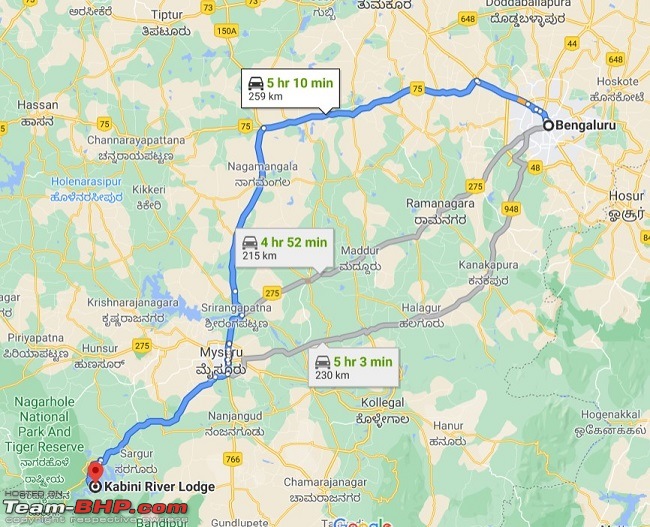 This road is about 40km longer, but turned out to be in excellent condition and I enjoyed driving on this. The usual NH75 if of course a beautiful 4-lane highway to drive one, but thankfully, even the state highway to Pandavpura, after existing NH75, was in great condition and was a joy to drive on. Beautiful state highway to Pandavpura was a joy: 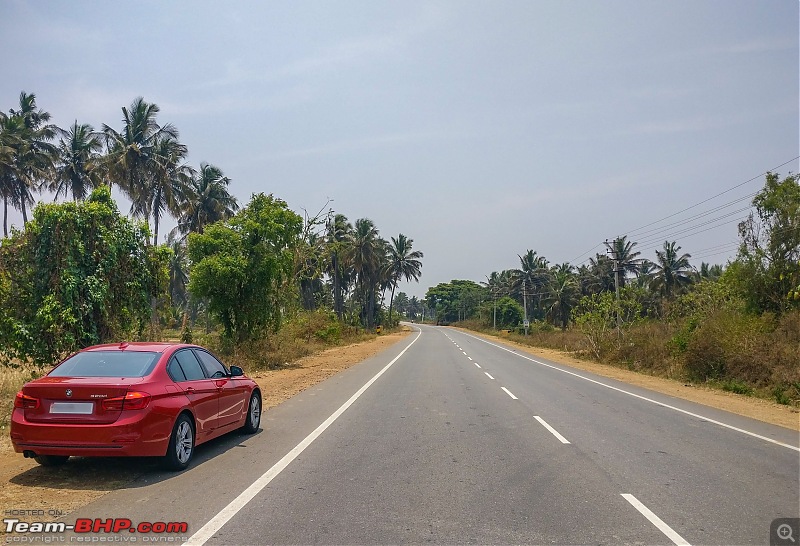 While I took the above detour, Robi and Jayanth took the usual Mysore road, and we directly met in Mysore. My 320d and Robi's M340i met in Mysore (And no, the M340i is NOT a taxi  . Yellow plates are because it was still on temporary registration): . Yellow plates are because it was still on temporary registration):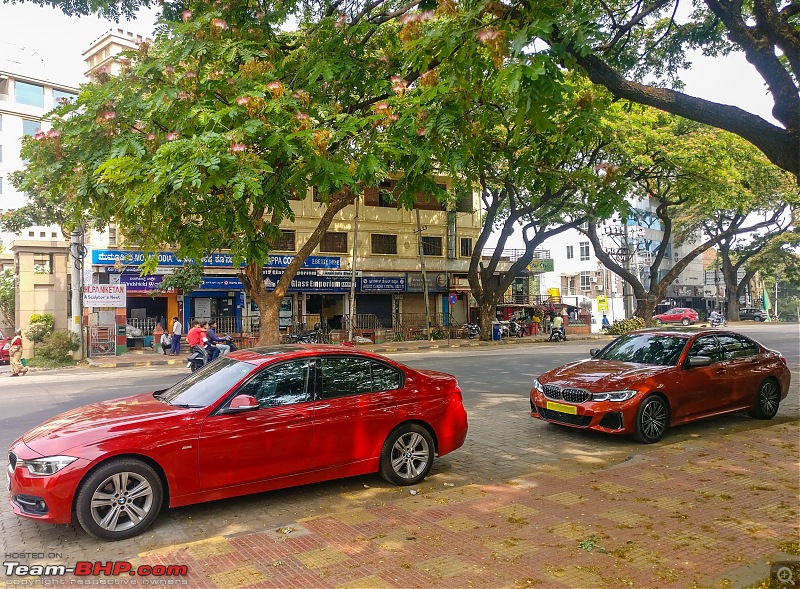 From Mysore to Kabini River Lodge, it is again some nice single lane roads with excellent conditions overall. It was hot and sunny, but we had some trees for company on the sides, and overall, it was a good drive too: 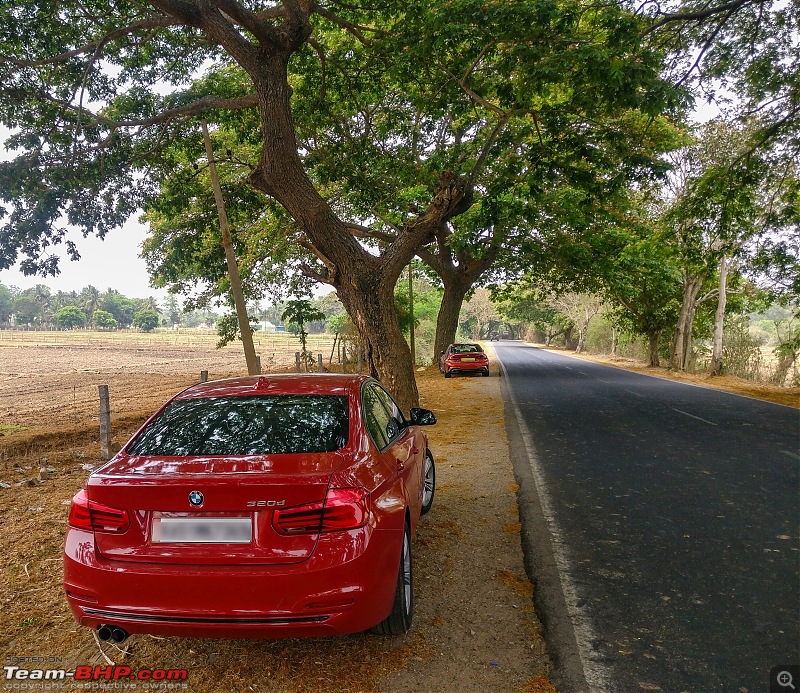 In a short while, the two cars arrived at our cottages in the Kabini River Lodge: 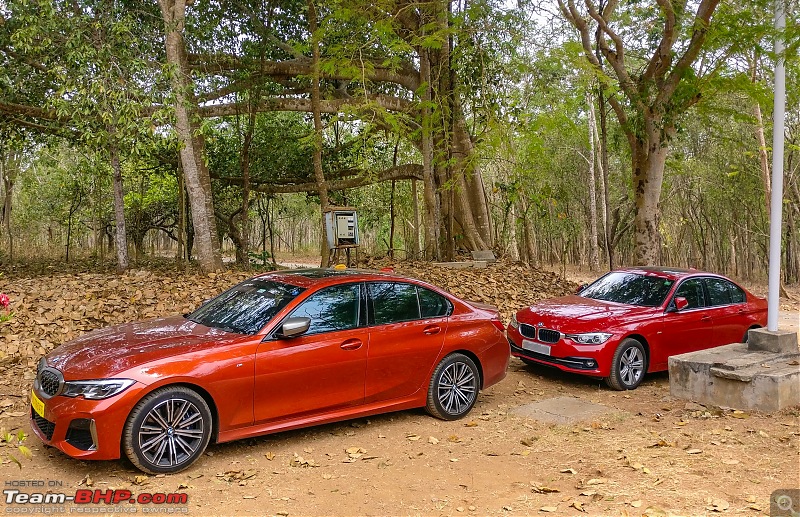 Last edited by Dr.AD : 4th April 2021 at 11:46. |
| |  (33)
Thanks (33)
Thanks
 |
| The following 33 BHPians Thank Dr.AD for this useful post: | Abhinav V, abirnale, arun_josie, Bhalla, Bibendum90949, BlackPearl, CEF_Beasts, FlashMustang, fluidicjoy, Gamerk, Gannu_1, Geo_Ipe, GTO, haisaikat, InControl, Jaguar, JTM, KarthikK, mankuthimma, megazoid, paragsachania, PearlJam, PrideRed, procrj, R2D2, RBalaM, SnS_12, suhaas307, Thermodynamics, Turbanator, vb-saan, vredesbyrd, yd_gli |
| | #3 |
| Distinguished - BHPian  Join Date: Apr 2010 Location: Bangalore/Pune
Posts: 1,913
Thanked: 20,649 Times
| Re: Cars, Wildlife and Photography Lessons at Kabini Jungle Safaris and LandscapesThe primary and probably the only agenda on the cards at Kabini River Lodge is the safari. They have two safaris included in each day's stay. In the afternoon they take you on a jeep safari through the Nagarhole forests around Kabini River (and hence the name of the lodge). And then next morning, you have a choice of a jeep safari again or a boat safari through Kabini River backwaters. The weather was typical summer weather - hot and dry. This was probably the driest time of the year. The landscapes were grey and brown instead of the usual lush green that you typically see in that area rest of the year. In our two day stay, we took a total of four jeep safaris. We were fortunate enough to have interesting sightings in three of the four safaris. In this post, I will share some pictures of the safaris and the landscapes in general (which I found to be as charming as the wildlife that we saw), and then in the next post I will present some of the wildlife sightings. When we set out for the jeep safari, we were greeted by such dry landscapes: 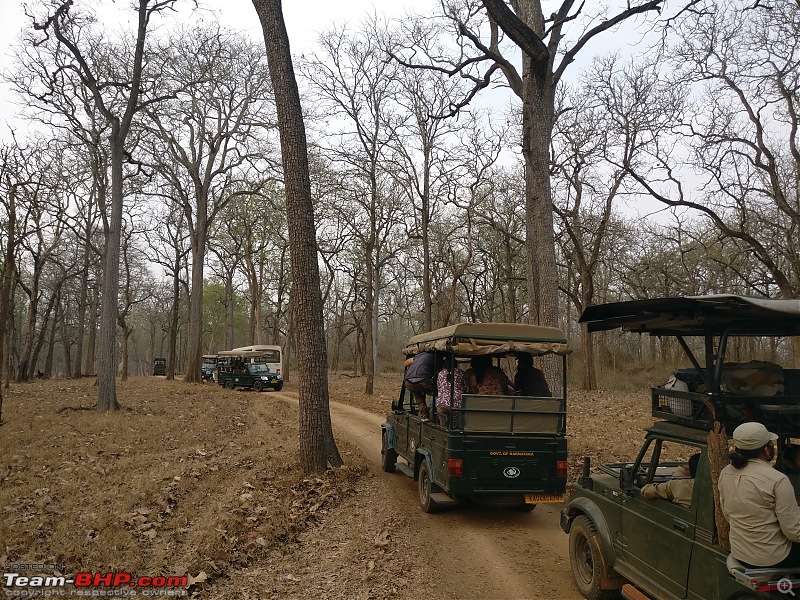 These dry brown paths were perfect for our Mahindra Bolero Camper rides: 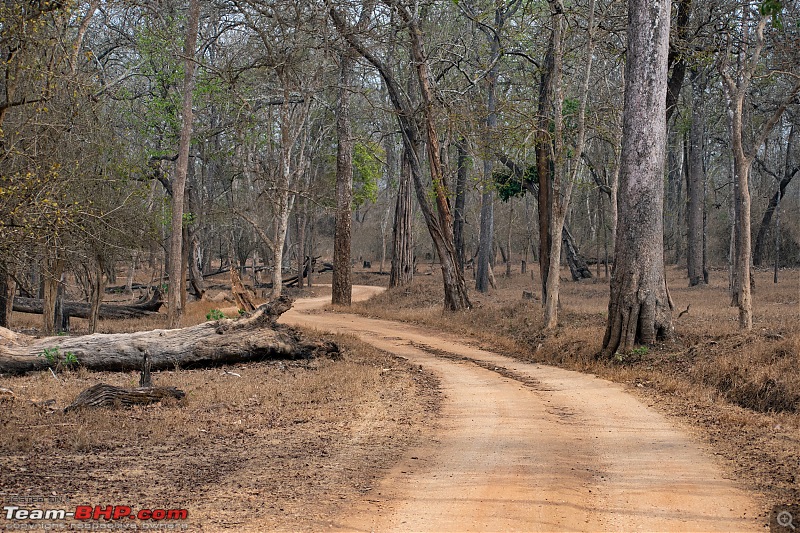 It was really as dry as it could get. I found these dry forests charming in their own way: 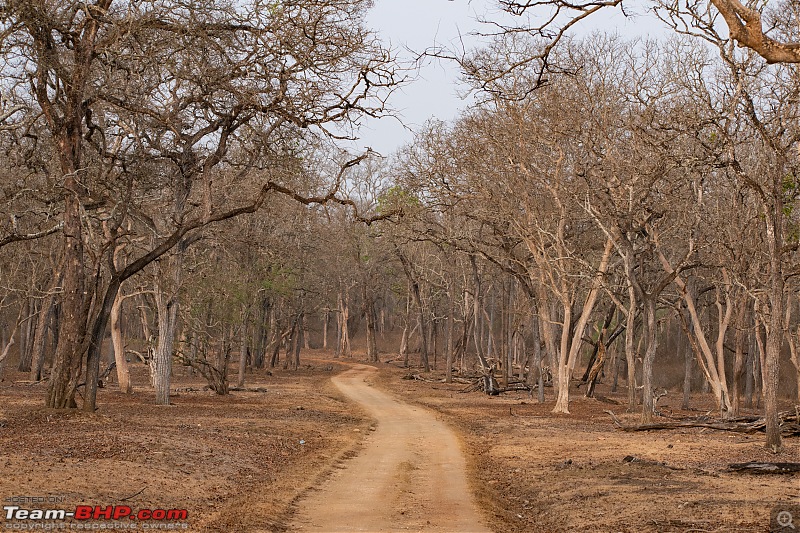 Although we were pretty much alone in our path most of the times, once in a while we would cross paths with the other safari riders: 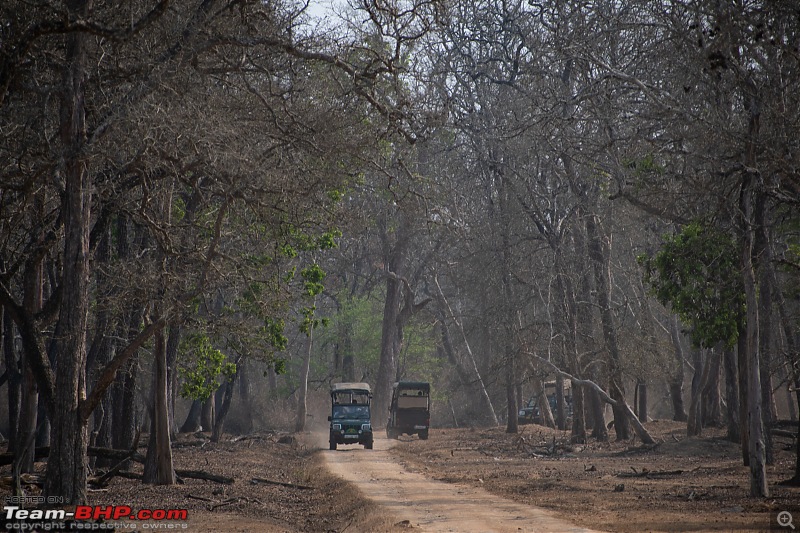 I was so enchanted by the lovely woods that I could not resist clicking pictures like these: 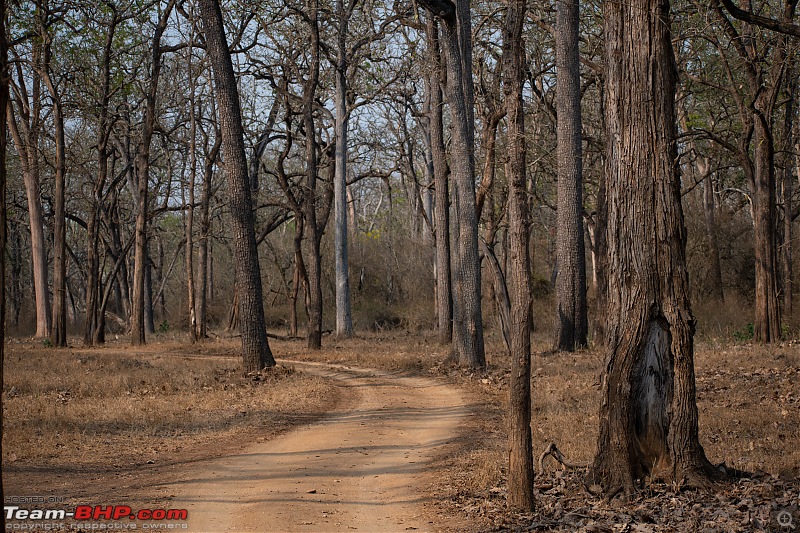 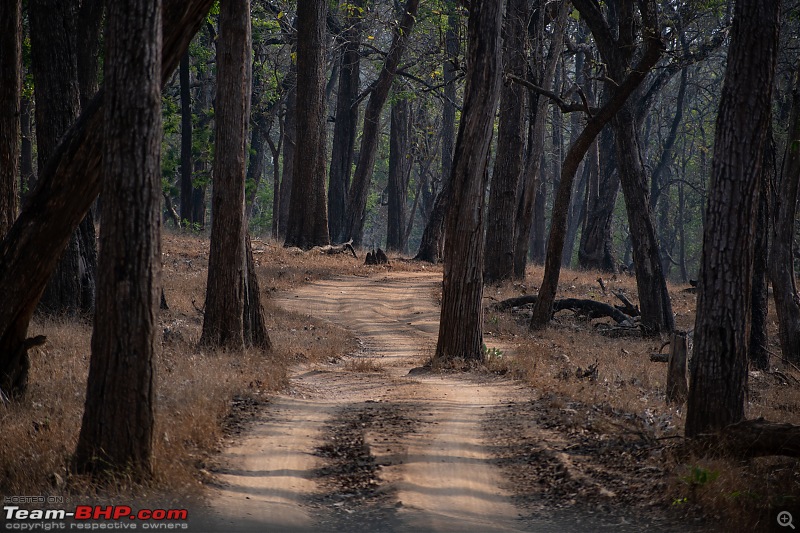 Some of the paths in the safari had some interesting characters and names. I heard jeep drivers calling this road "Power Line Road", for the obvious reason: 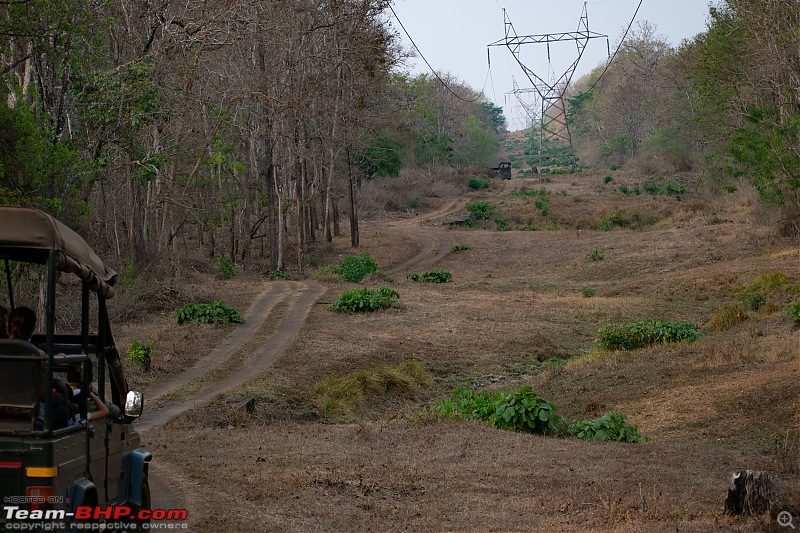 Once in a while the expert naturalists driving each safari jeep would hear some unique calls from monkeys or sambars about movement of some big cat in that area, and stop there and wait for the sightings. These were the most exciting moments. Moments where one imagined (and hoped) that a wild animal would come out and stand in front at any moment! I was amazed by the skills of these experts to spot these signs of animal presence and spot them with great precision. And at these points, sometime, a few of the vehicles would gather together. One of the biggest attractions in these jungles is the famous black panther, Saya (https://www.toehold.in/blog/black-panther-in-kabini/). We came very close to spotting Saya, based on the presence detected by the naturalists in the safaris, but unfortunately, we did not actually see it. The moment when Saya was nearby and these jeeps were eagerly waiting in silence for that much sought after sighting: 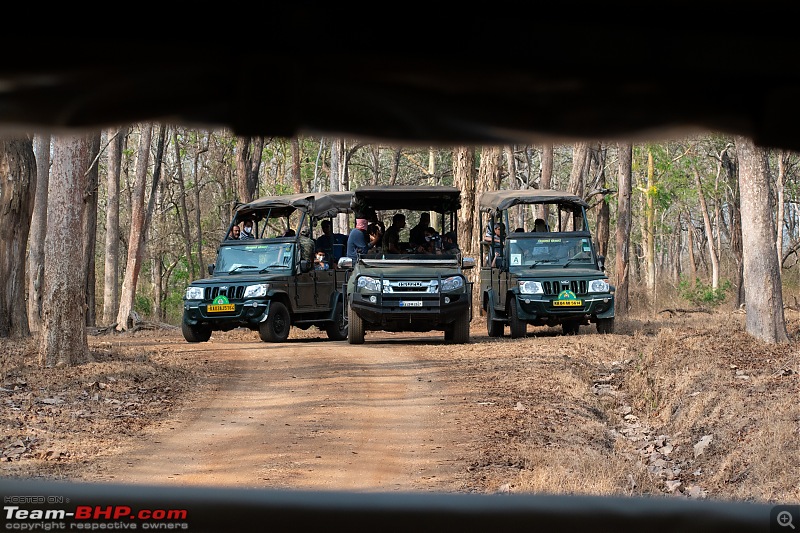 Another such moment when we actually spotted a leopard sleeping on a tree (that picture is in the next post): 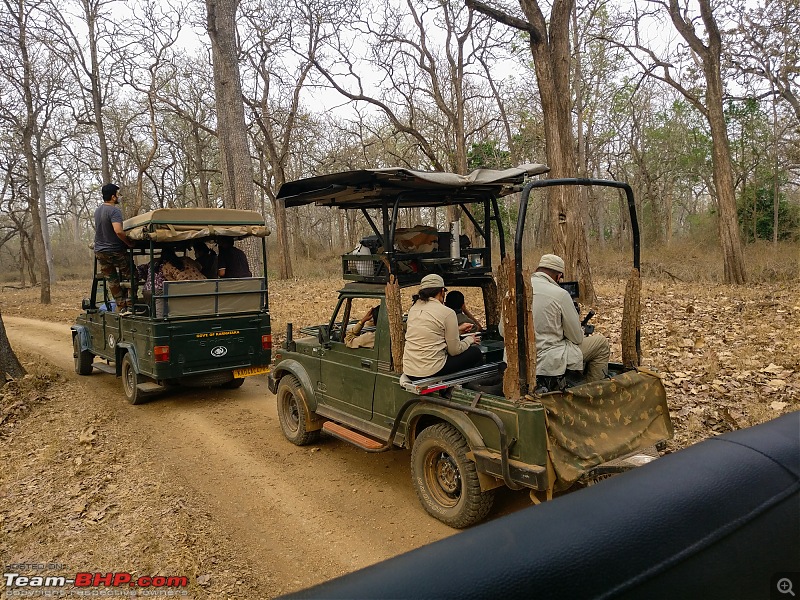 Some areas of the forests were bone dry, like this one: 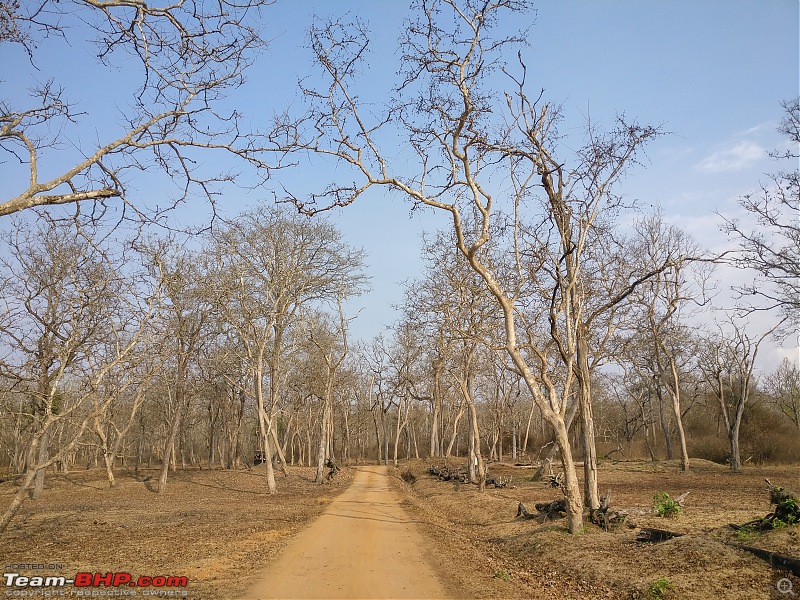 While some areas had a few green touches: 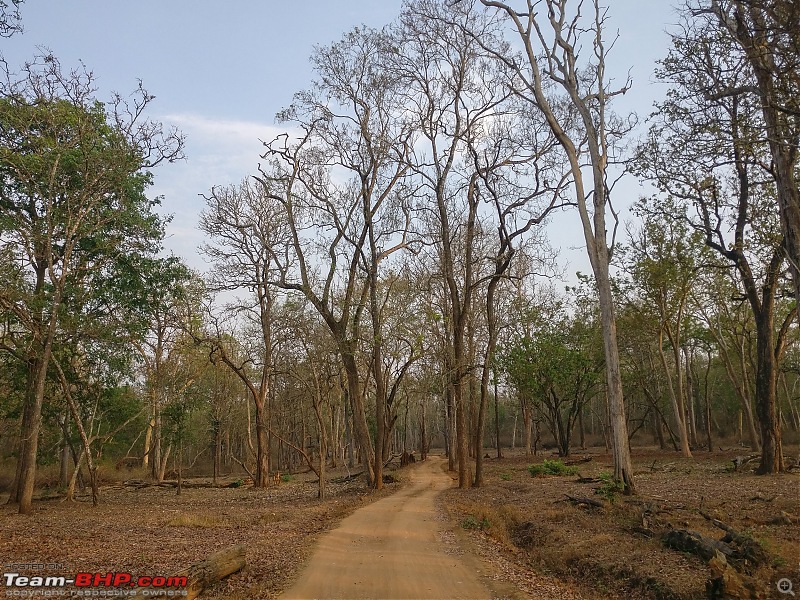 Not just some green touches once in a while, but some of the trees even had such charming summer flowers: 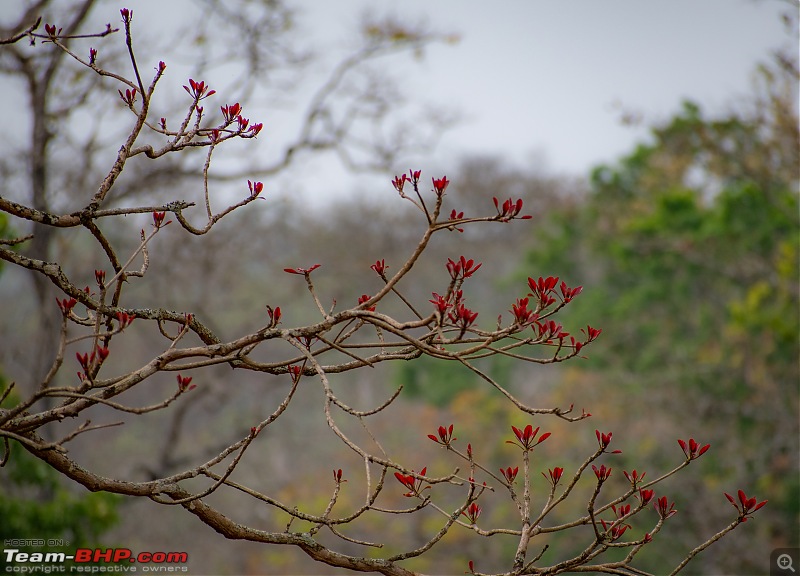 A close-up of the red flowers: 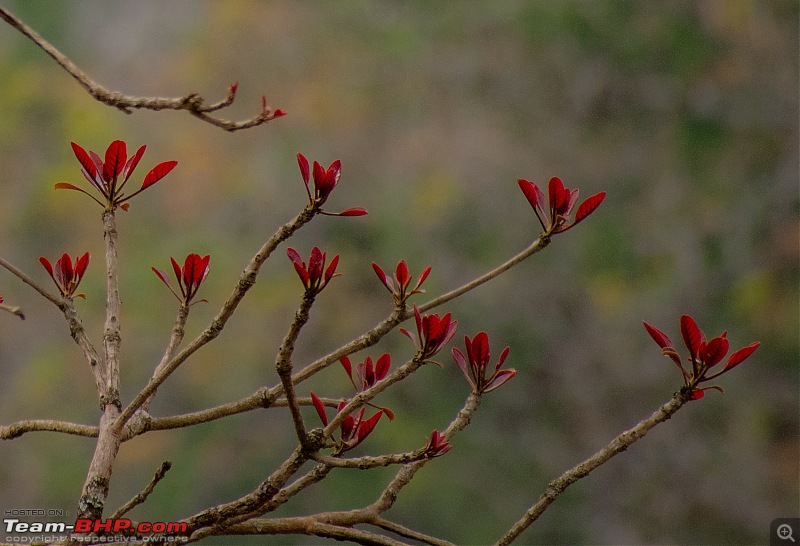 As the evening sun started going down, it went behind those dry tress and created great scenes. I was mesmerized by the sun behind these trees, as much as I was by the dry mystery of the forests. While others were busy spotting animals, I was busy clicking these photos: 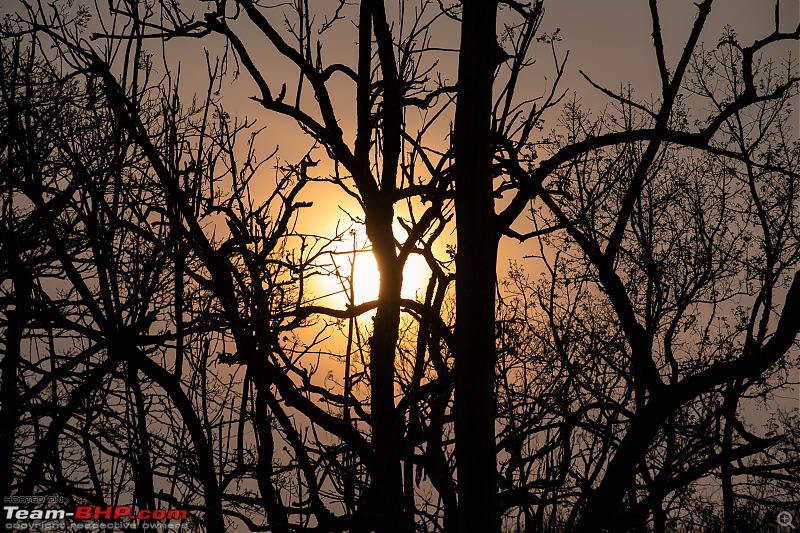 Only in the dry summer one would see such a scene. Else it would be thick green forest rest of the year: 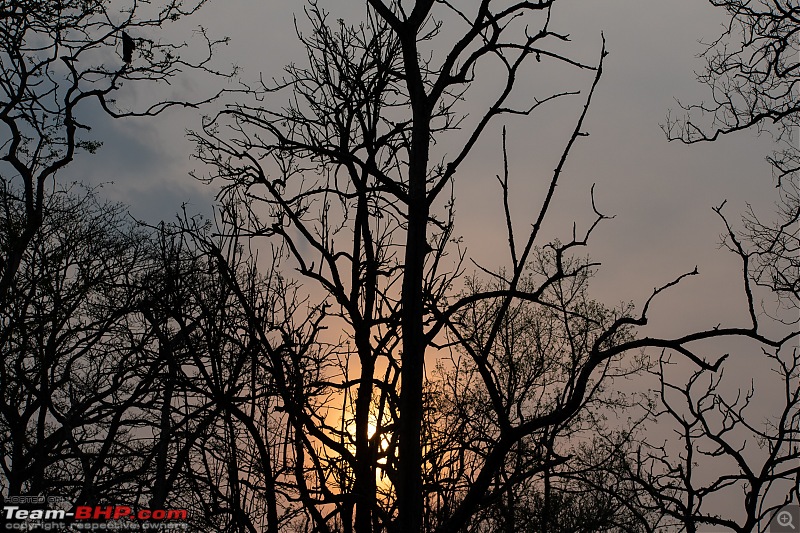 This was really a unique sunset photo opportunity for me. I have shot sunsets in the sea and the mountains, but a sunset behind such dry tress offered a new experience: 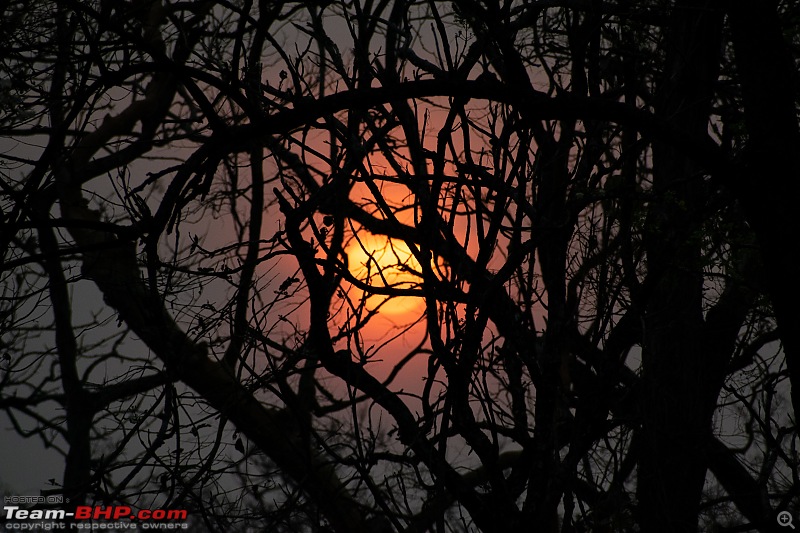 As the sun was just about to go down, we reached a water body which had just enough greenery around to break the brown monotony. And that offered such sunset views: 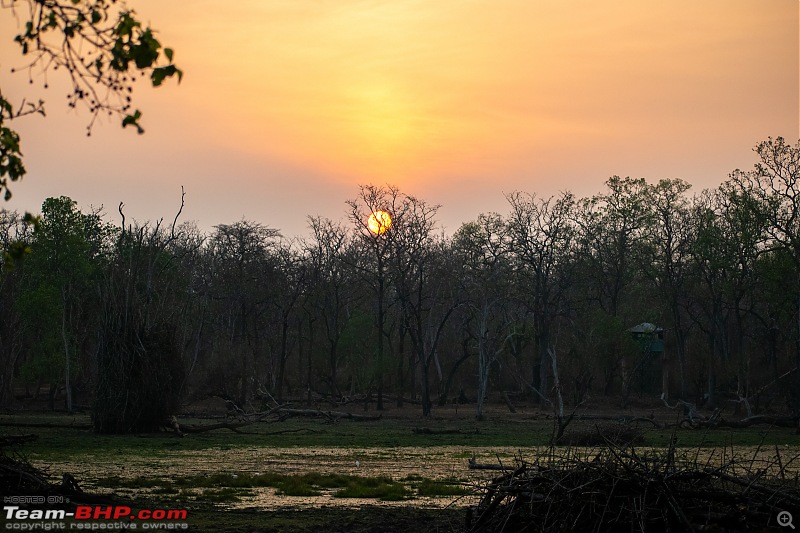 Last edited by Vid6639 : 4th April 2021 at 14:57. Reason: minor formatting |
| |  (31)
Thanks (31)
Thanks
 |
| The following 31 BHPians Thank Dr.AD for this useful post: | 2himanshu, Abhinav V, abirnale, arun_josie, Bibendum90949, BlackPearl, CEF_Beasts, Fateh Salim, FlashMustang, Gannu_1, graaja, GTO, haisaikat, InControl, JTM, KarthikK, mankuthimma, megazoid, paragsachania, procrj, R2D2, rahulananda, RBalaM, saikarthik, SnS_12, Thermodynamics, Turbanator, vb-saan, Vik0728, vredesbyrd, yd_gli |
| | #4 |
| Distinguished - BHPian  Join Date: Apr 2010 Location: Bangalore/Pune
Posts: 1,913
Thanked: 20,649 Times
| Re: Cars, Wildlife and Photography Lessons at Kabini Wildlife SightingsNow comes the most exciting part for a newbie wildlife photographer like me - the wildlife photos! As I mentioned, we were lucky enough to spot something interesting in three of the four safaris. A huge credit for that goes to Jayanth, who is not only an expert photographer, but also an expert naturalist. He knows the jungles of Kabini like the back of his hand, and he had detailed knowledge of the animals and their movements in the area. He could almost sense where the animals there. He could hear the calls, he could sense movements, he could read the minds of the animals and predict where they would go. Here Jayanth acted like our person expert guide, and it was an amazing experience to hear his wildlife stories, his thought process about spotting animals, and of course, his timely tips to me about photography. As we started with our first afternoon safari, my photography experience journey started with this bee eater: 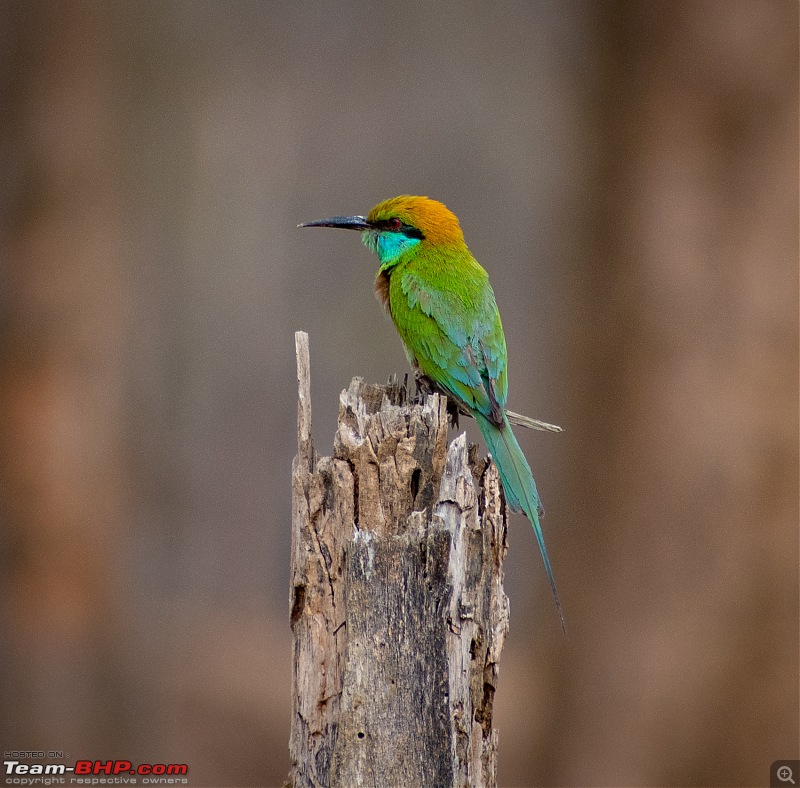 And then a peacock (which were in plenty and seen everywhere, along with monkeys and deer): 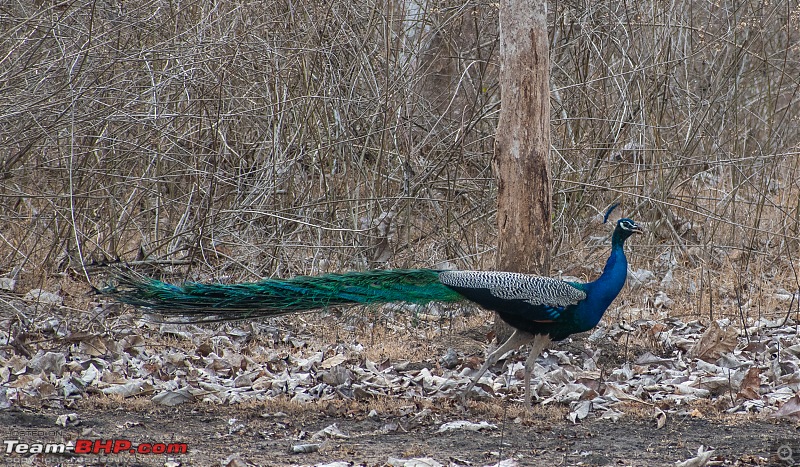 This dancing peacock was a bit too far for the reach of my lens, and the poor image quality is due to heavy cropping: 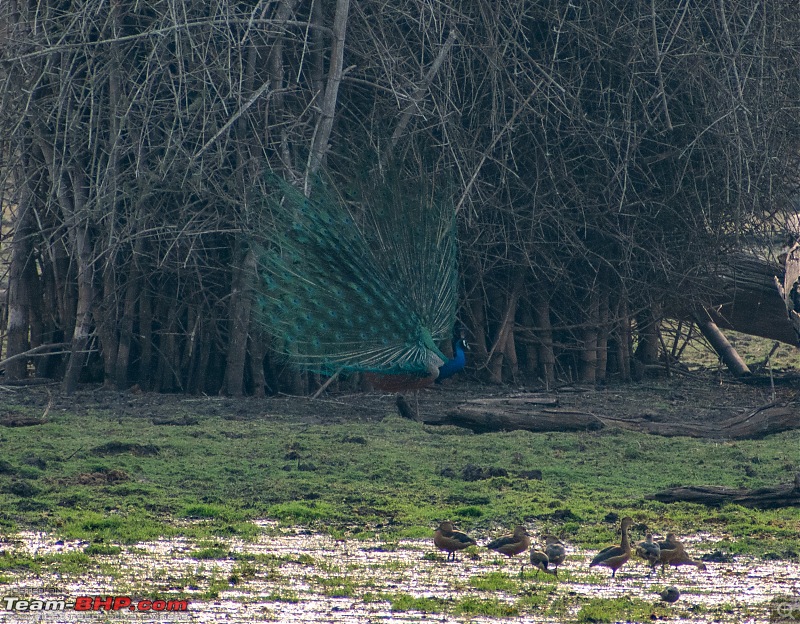 A sambar on the water: 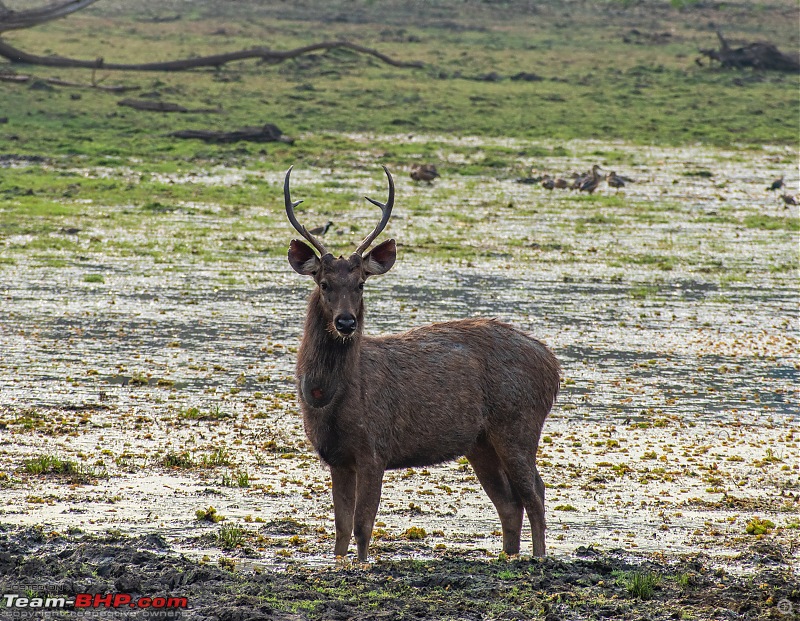 While we drove around in the jungle searching for something more interesting than the above, it looked like we would have to be satisfied with only the common sightings like above for the day. The sun was slowly going down and there was no sign of anything really special to see. This is where Jayanth's intuition saved the day for us. He had some discussions with the jeep driver, and they mutually decided to drive on a specific road. And once on the roads, there was the moment when suddenly there were plenty of strong calls from the sambars and the monkeys that someone was there. We were slowly inching forward, looking all around to see if we could see something special, and then all of sudden, it was Jayanth who shouted "tiher, there..." pointing his hand at some location. I was amazed at his ability to spot that tiger which was totally camouflaged in that brown background, even from a distance of about 100m. And when we looked where he was pointing, we could see it too. There it was. A tiger on the right of the road a bit ahead of us. We all went dead quiet, and the jeep driver inched forward our jeep to take a closer look. And then, we got great views as the old tiger slowly crossed the road right in front of us. My first ever tiger photograph: 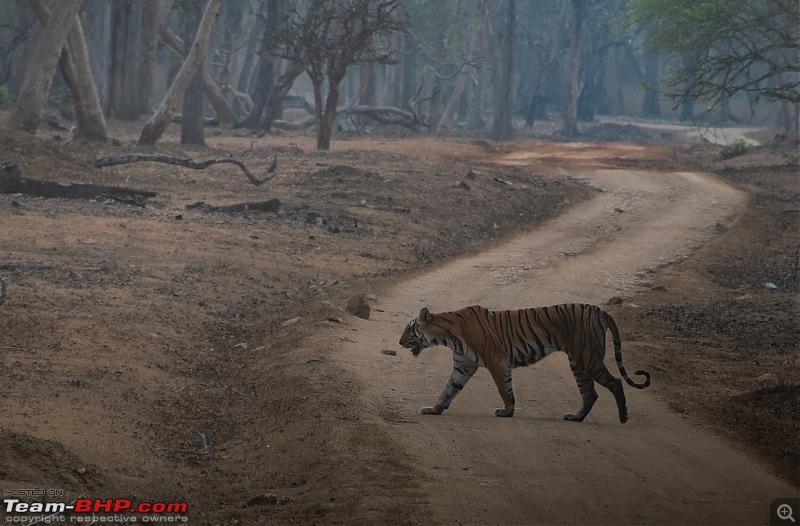 As it crossed the road and went to the left, we got closer views: 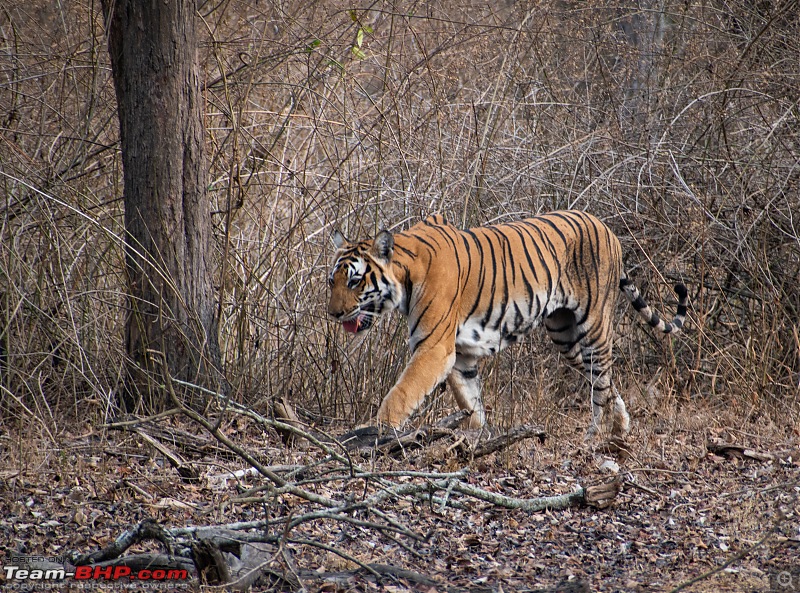 We stood there watching this guy slowly walking around, and then it eventually went away in the thick dry grass. It was truly a memorable experience. It made our day. As it turned out, there was one more interesting sighting for us that day. While we were coming back after the tiger sighting, one of the other safari drivers while passing by us told us about a leopard on a tree nearby. We promptly went to that spot and saw a few vehicles parked there already. Everyone was staring at a particular tree. Some videographers had their camera rolling, and some photographers has their massive lenses pointing to the tree. Everyone was dead quiet through, and it an an ambiance of suspense and mystery. When we found our own right spot to get a clear view of that tree, this is what we saw. A leopard peacefully sleeping on the tree: 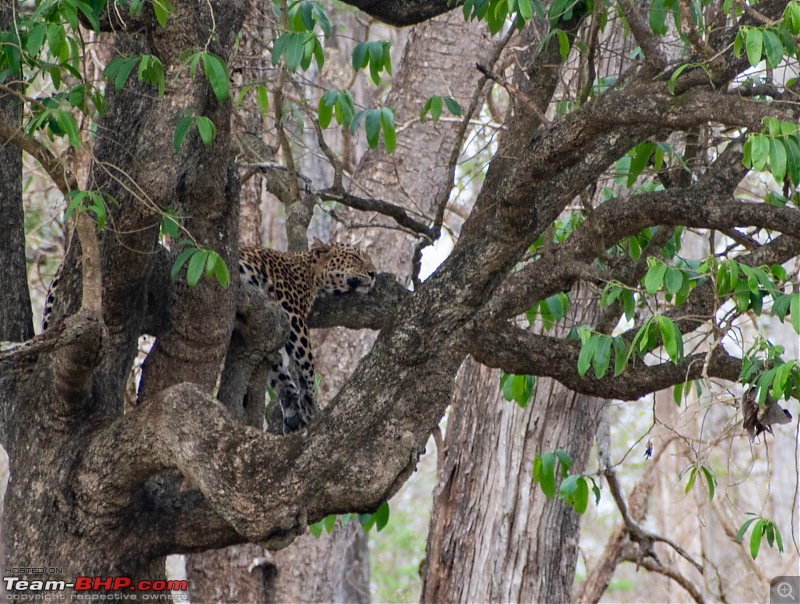 Everyone waited there for a long time hoping the leopard would wake up. It was a great scene. The leopard was peacefully sleeping, while the monkeys on the tree were making weird sounds and jumping around trying to scare away the leopard! The leopard would open its eyes once in a while and then go back to sleep again. After waiting for a long time, we had no choice but to leave the spot as the leopard showed no sign of getting up. On that note, we ended our first day safari, and came back the next morning with a lot of excitement and expectations. And again, the morning safari started on a note where we saw a plenty of monkeys, deer and peacocks around, but no sign of something special. Deer and peacocks, along with monkeys were the most common sightings: 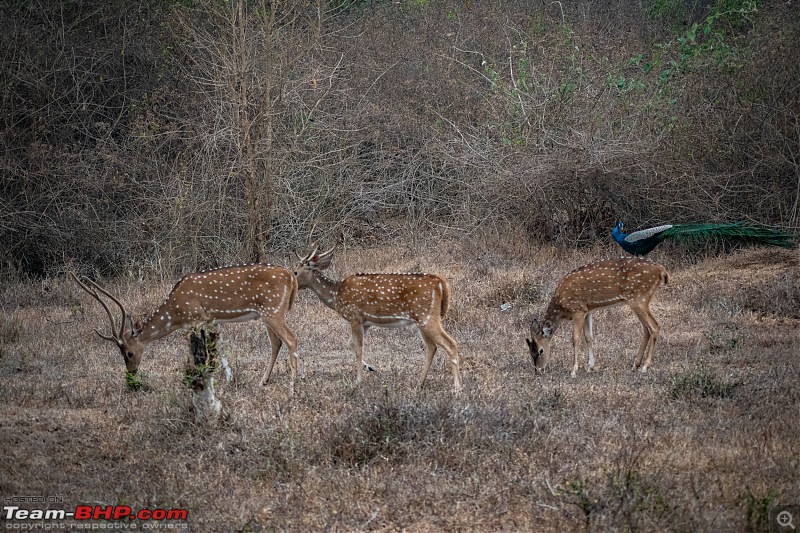 We moved around for almost two hours, with nothing really special to see. I was enjoying the ride through the forest anyways, and I was also enjoying the views of the landscapes and the dusty brown path. Jayanth was busy trying to decode calls and signs, and he was constantly in contact with other jeep safaris in case they saw something special. Just when we were about to give up and go back to the lodge, we got a message from another safari about a tiger at a location quite away from where we were. We decided to drive there anyways and take our chance. Our driver then gave us a nice jeep ride for about 20 minutes across the width of the forest to reach that far away location. Finally we reached that spot, and thankfully, the tiger was still there. This time we got a great position and got clear views of the tiger from a close distance: 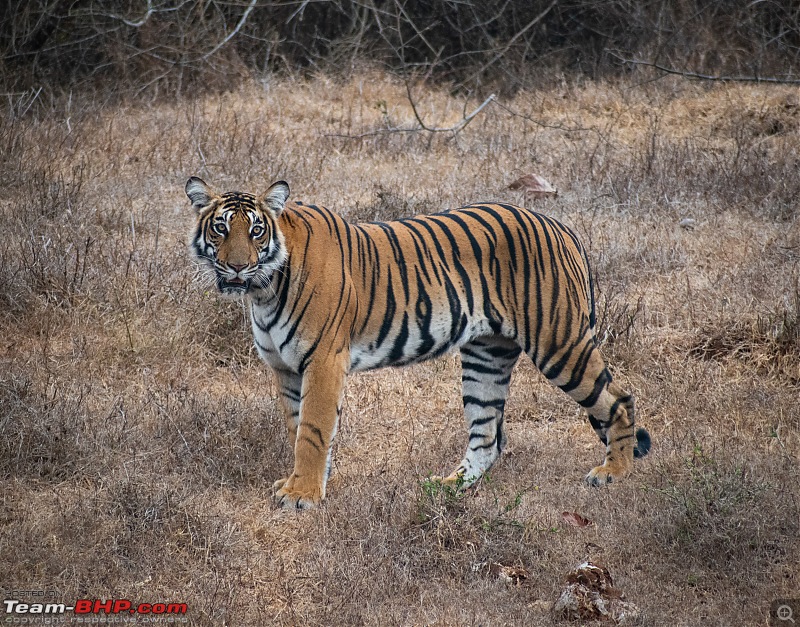 It walked around a while and then gave us the most majestic pose: 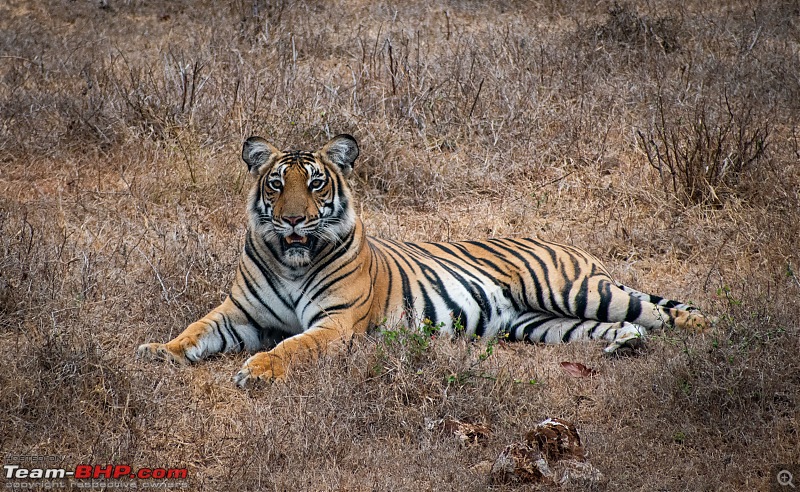 We waited there for a while and spent a good amount of time watching that tiger until it got up and slowly walked away. Supremely satisfied with that experience, we ended the safari on that note and went back to the resort. When we came out for the evening safari, we went to the backwaters again. The usual sightings of peacocks again to start of this session: 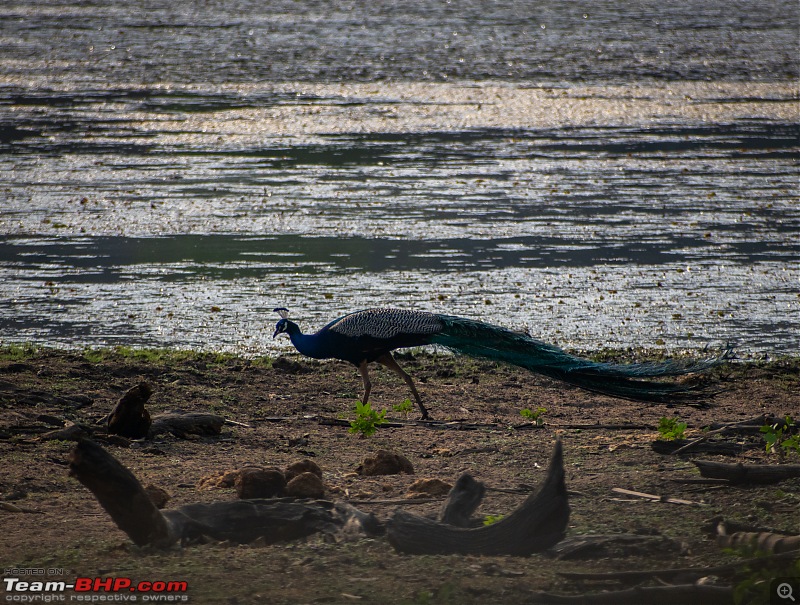 There was an elephant playing in the river. It walked around there giving us interesting poses, and then came out to a tree nearby and started breaking branches of the tree and eating leaves. We spent a good amount of time watching the elephant and taking pictures. Elephant playing in the river: 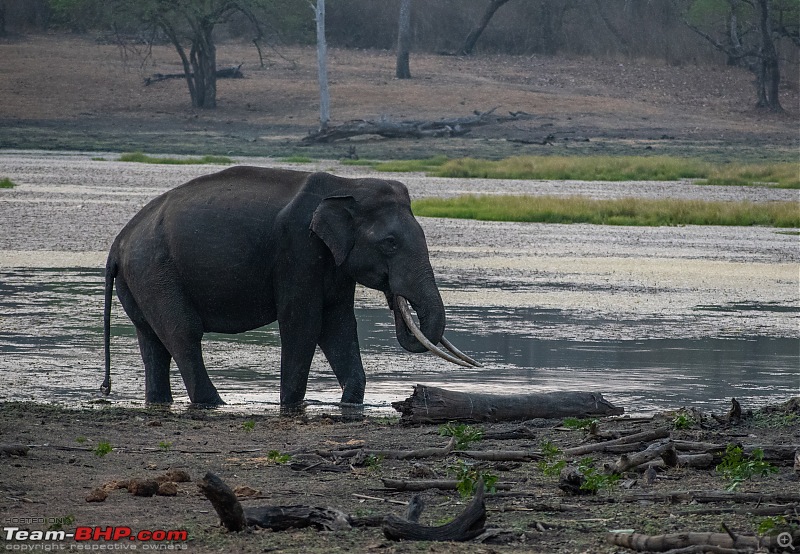 Looking straight at us, but then decided to ignore us: 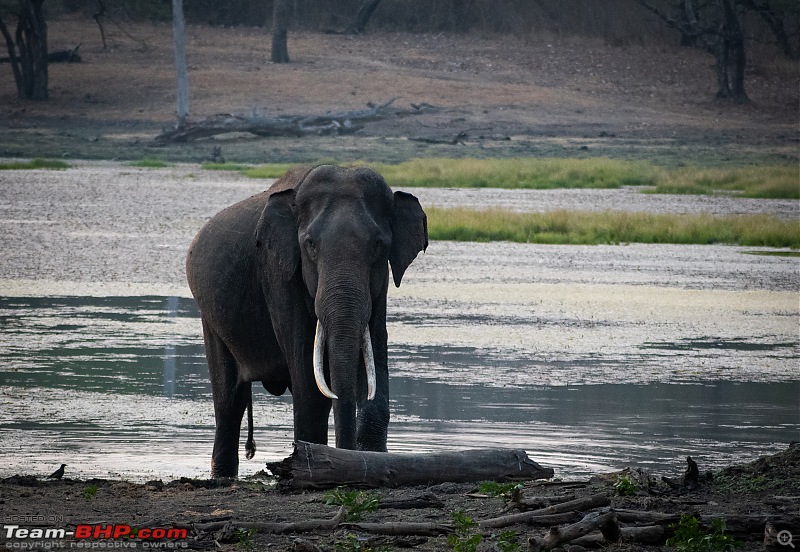 Then it came out of the water and marched to a tree: 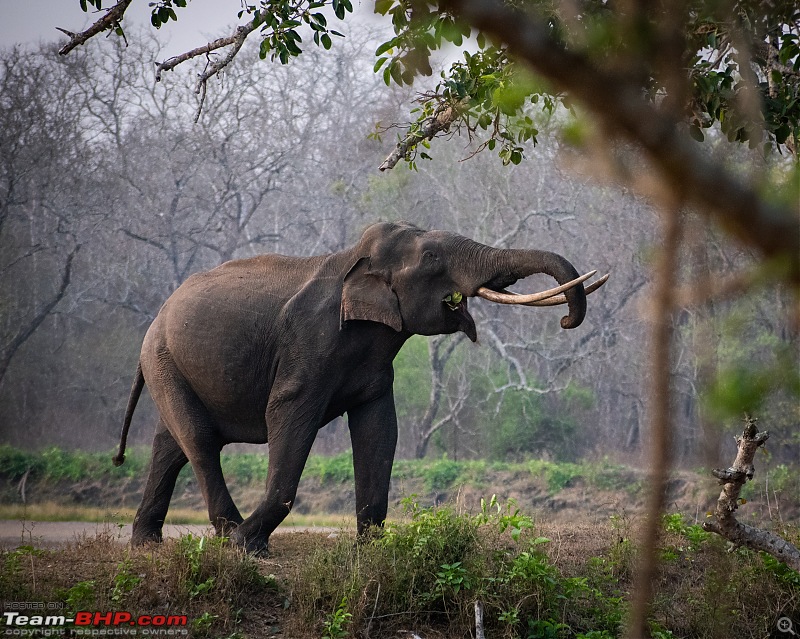 And started bringing down the branches: 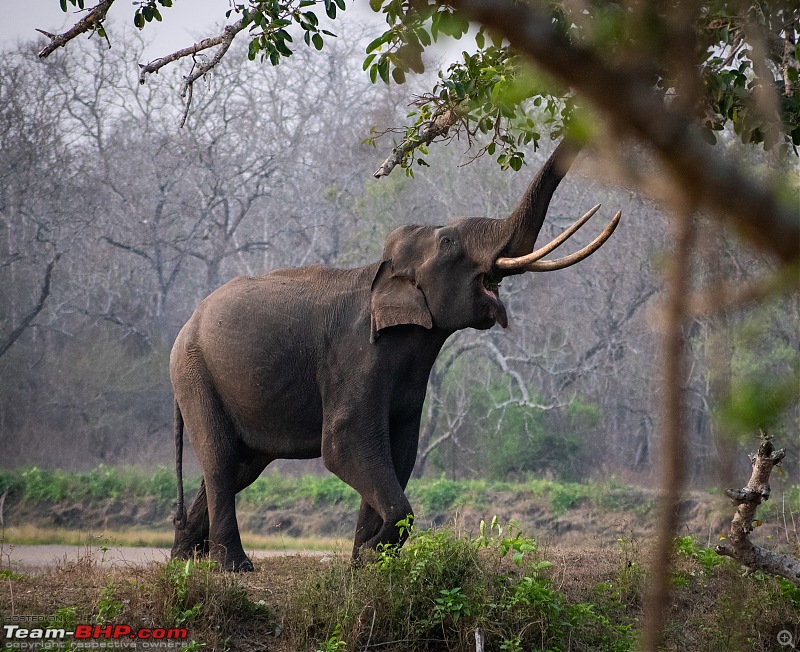 The elephant gave us great poses while eating the leaves: 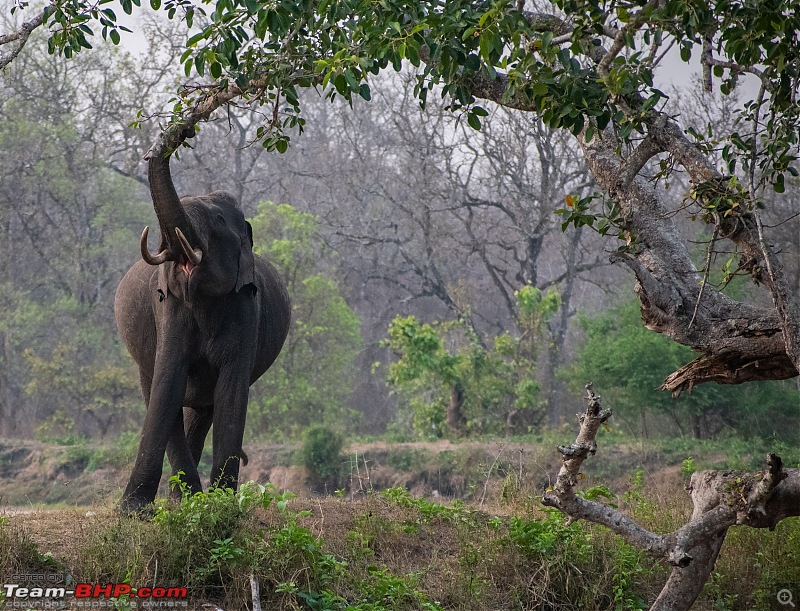 A parting shot of the elephant as we decided to call it a day: 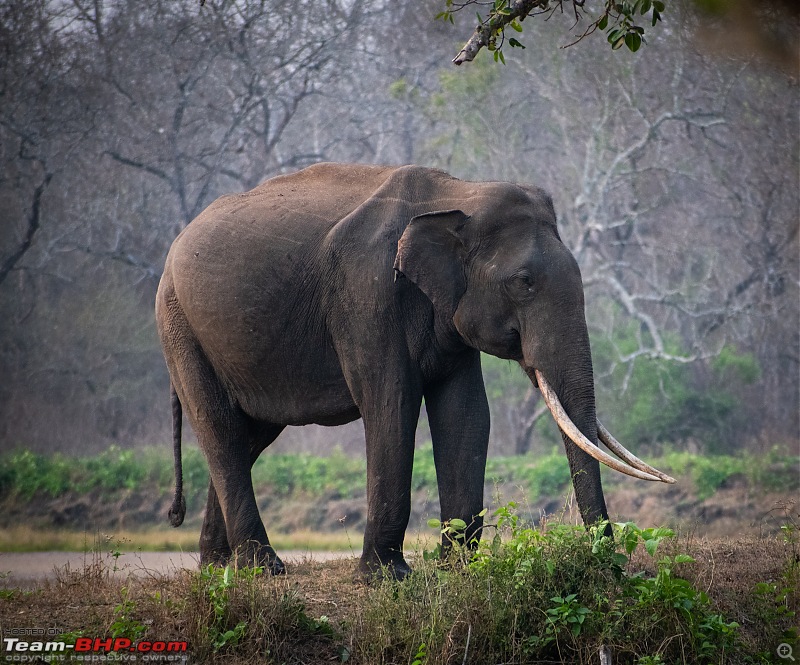 Th fourth safari the next morning was the only safari where we did not see something that big. But nevertheless, it was a great experience riding in that jeep through the forest, and we saw enough interesting small things. Let me wrap this up with a few of the miscellaneous sightings. A giant squirrel (these were also a relatively common sighting): 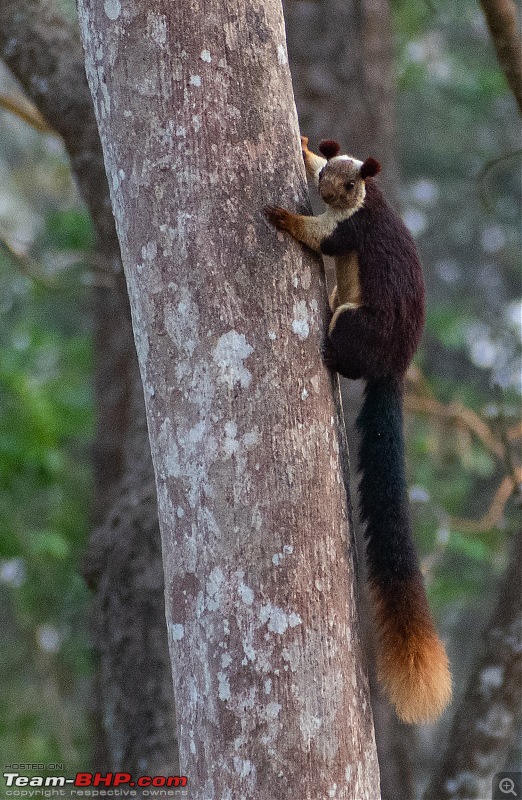 A monkey family enjoying the morning (the most common sighting): 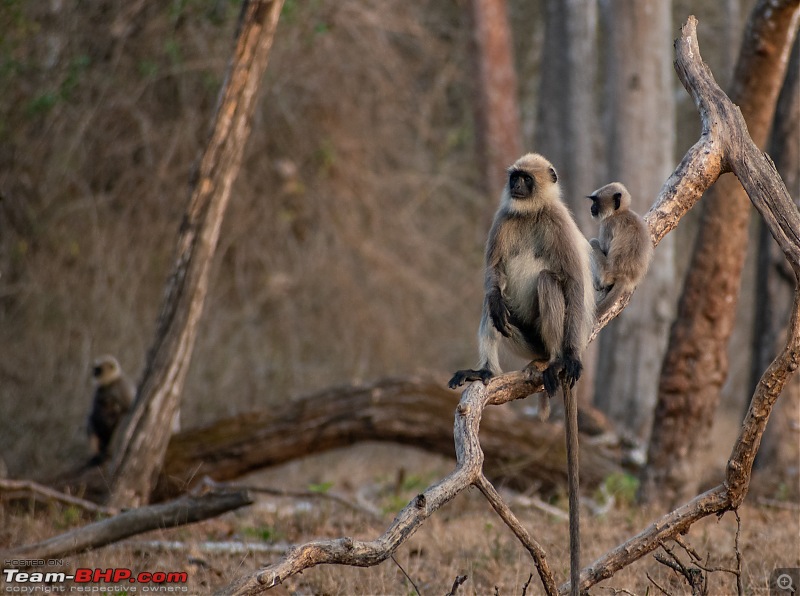 Look at the baby monkey peeping out: 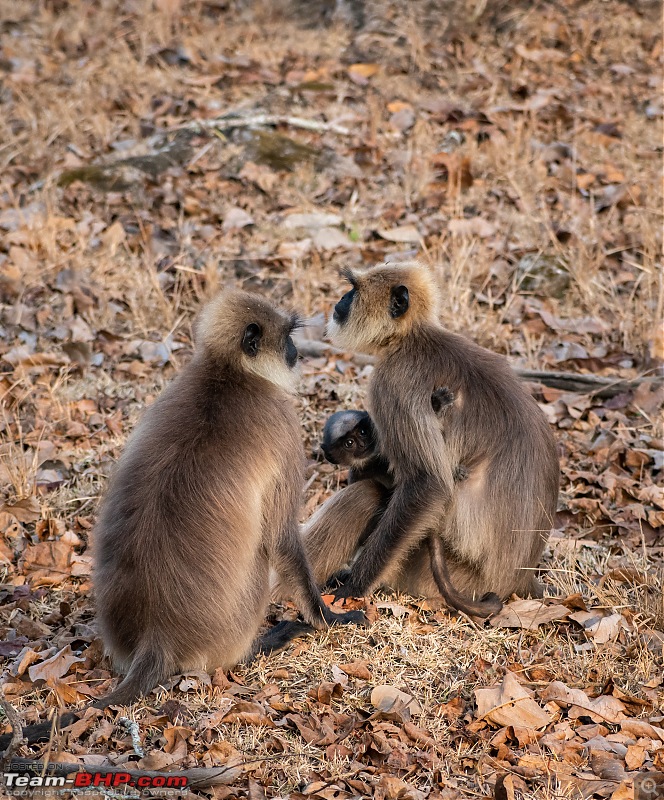 A mother monkey with a baby: 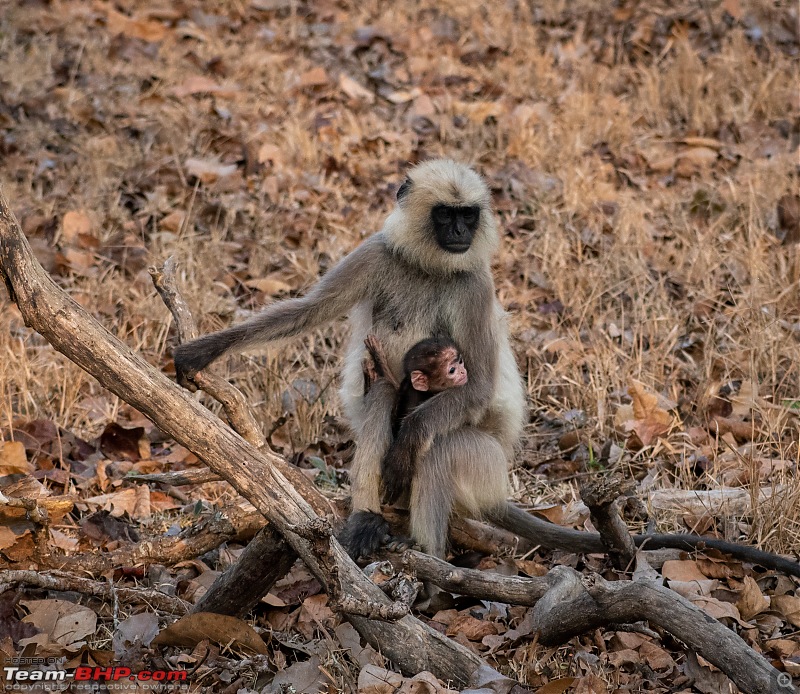 We saw this Indian Roller eating a lizard for breakfast: 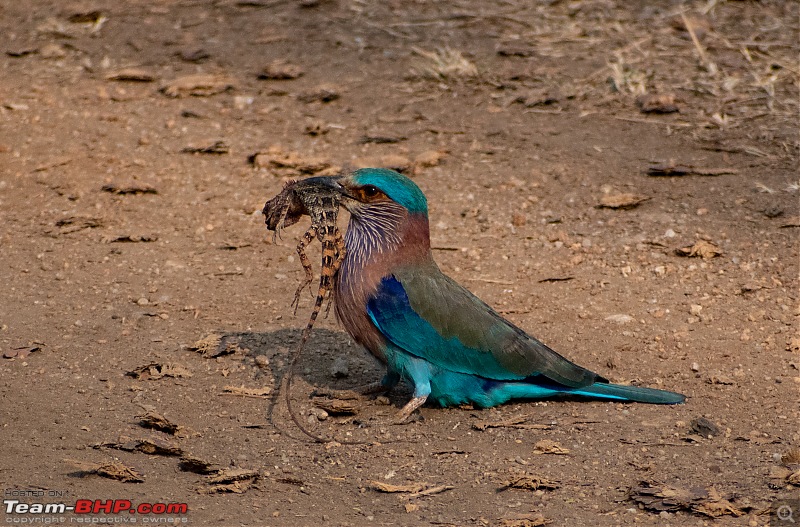 A sambar and a deer at a waterhole: 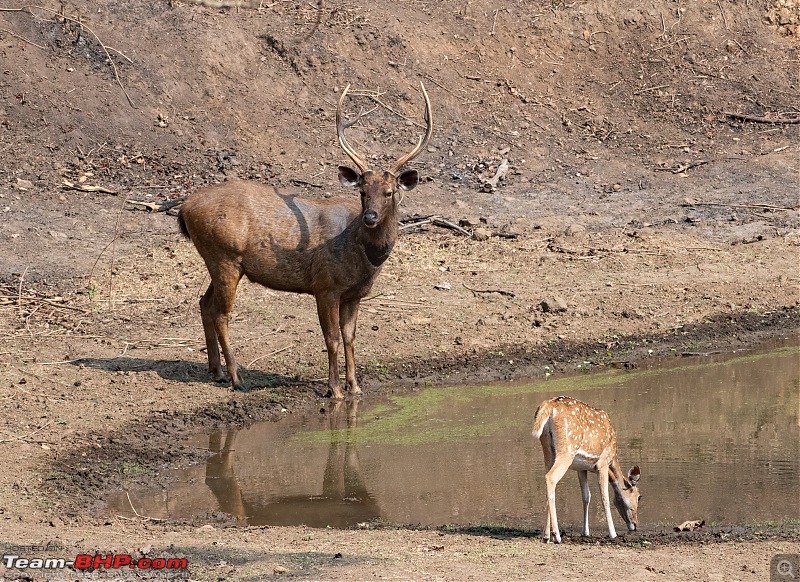 Last edited by Vid6639 : 4th April 2021 at 14:58. |
| |  (42)
Thanks (42)
Thanks
 |
| The following 42 BHPians Thank Dr.AD for this useful post: | 2himanshu, Abhinav V, abirnale, amvj, arun_josie, batladanny, Bhalla, Bibendum90949, BlackPearl, CEF_Beasts, dean5545, FlashMustang, fluidicjoy, Gamerk, Gannu_1, graaja, GTO, GutsyGibbon, haisaikat, InControl, JTM, KarthikK, megazoid, paragsachania, PearlJam, PrideRed, procrj, R2D2, rahulananda, RBalaM, sid_deb, sknair, SnS_12, Thermodynamics, Turbanator, varunanb, vb-saan, Venkygupta, Vik0728, vredesbyrd, ysjoy, zebo |
| | #5 |
| Distinguished - BHPian  Join Date: Apr 2010 Location: Bangalore/Pune
Posts: 1,913
Thanked: 20,649 Times
| Re: Cars, Wildlife and Photography Lessons at Kabini Car PhotoshootsWith two colorful BMWs at hand, it was impossible for me not to revert back to my favorite type of photography - car photography. Whenever we got some time in-between safaris, we tried to quickly grab our cameras and take a couple of pictures of our cars at various locations with this the resort. Here I am posting some of my own pictures as well as some pictures taken by Robi (with due credit given to him in the picture caption). My car parked at the resort: 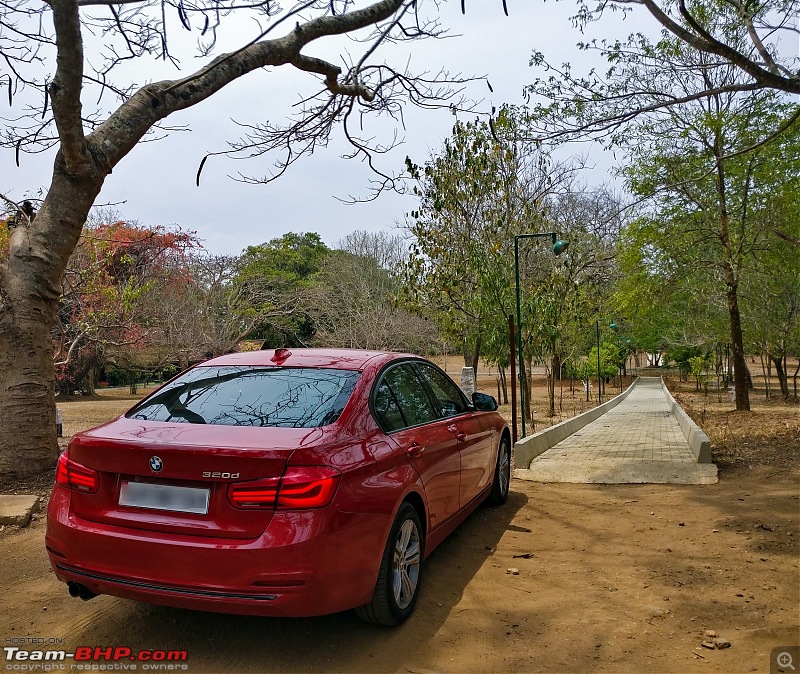 A close-up shot by Robi: 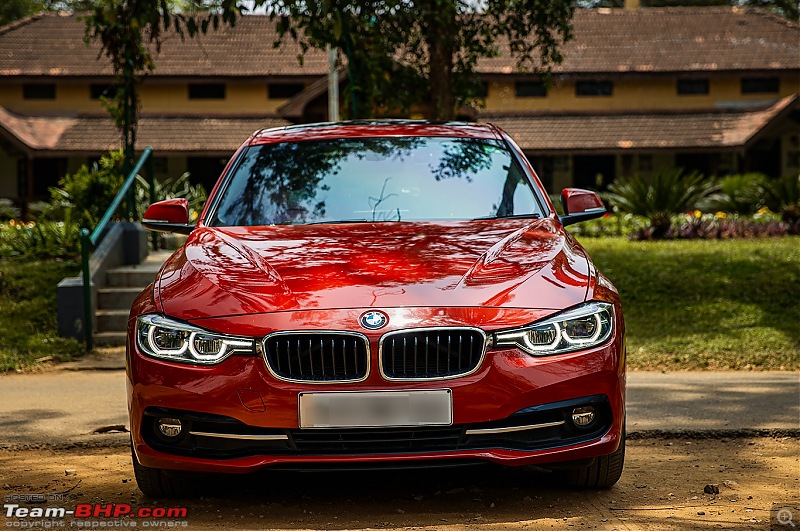 I practiced my camera from the side: 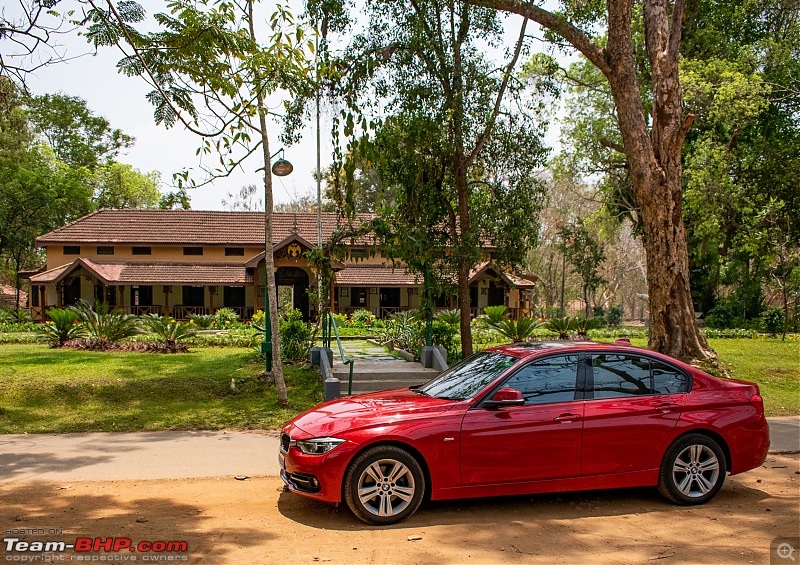 While Robi was shooting this from another angle: 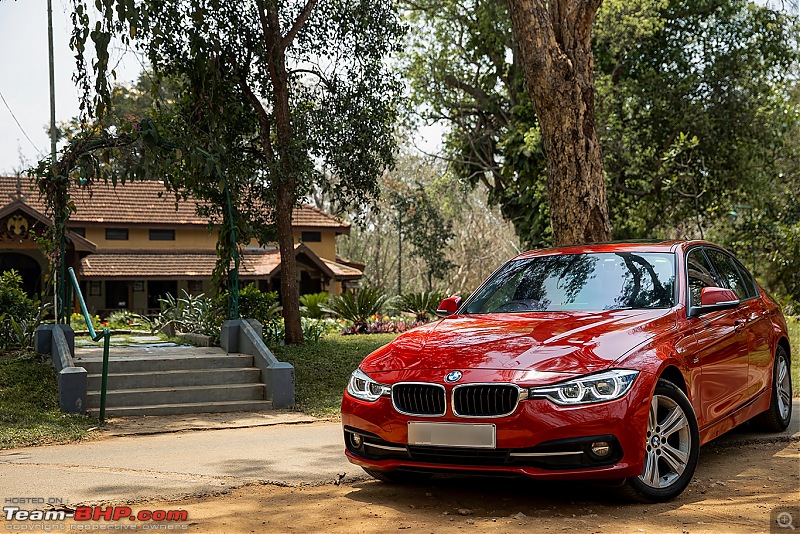 Robi's hot new M340i: 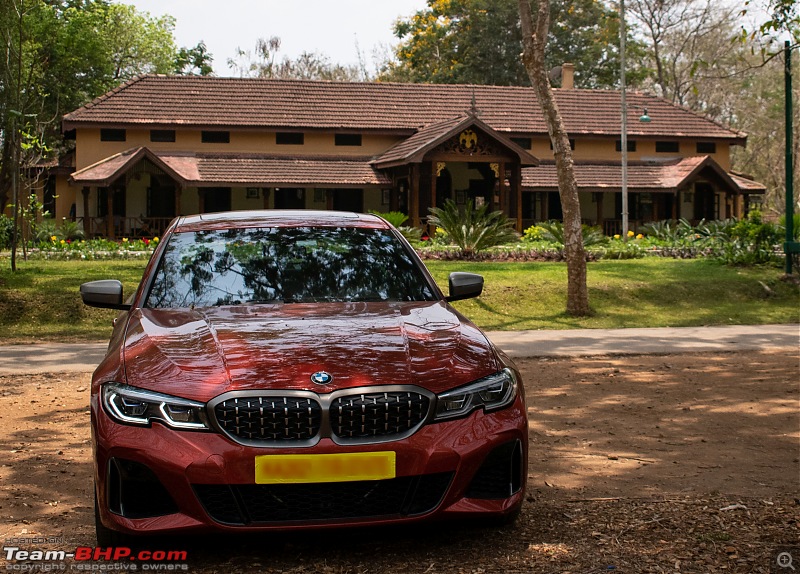 This side view of my car as shot by Robi: 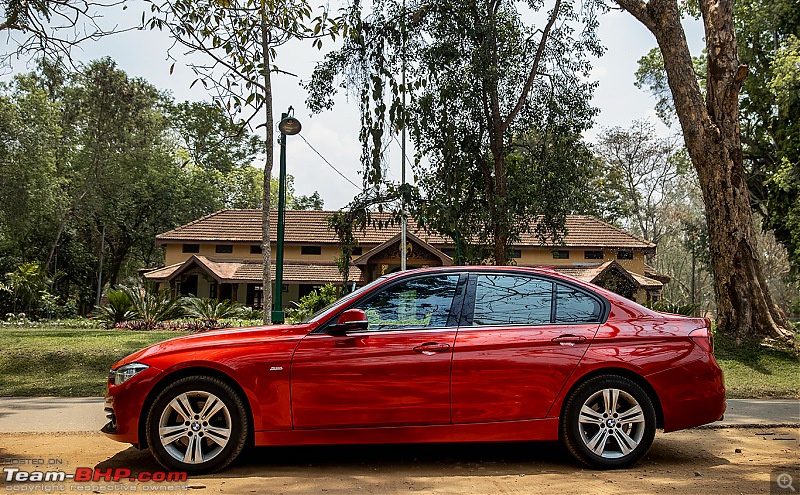 Another close-up shot by Robi: 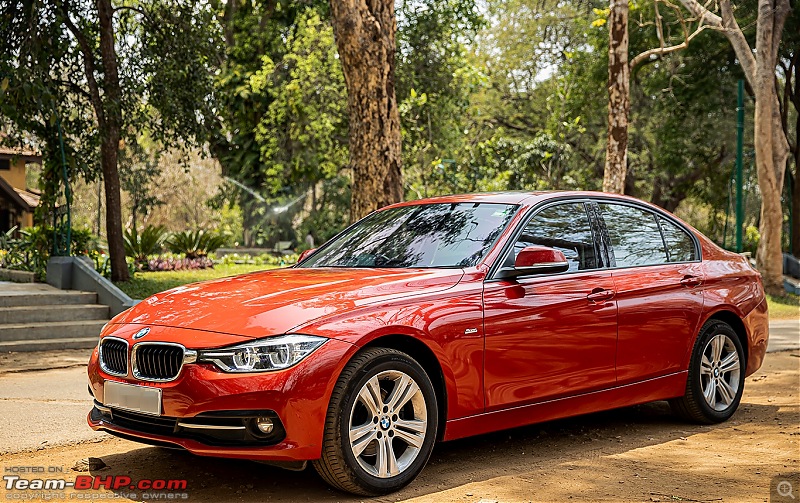 A lovely frontal close-up shot by Robi: 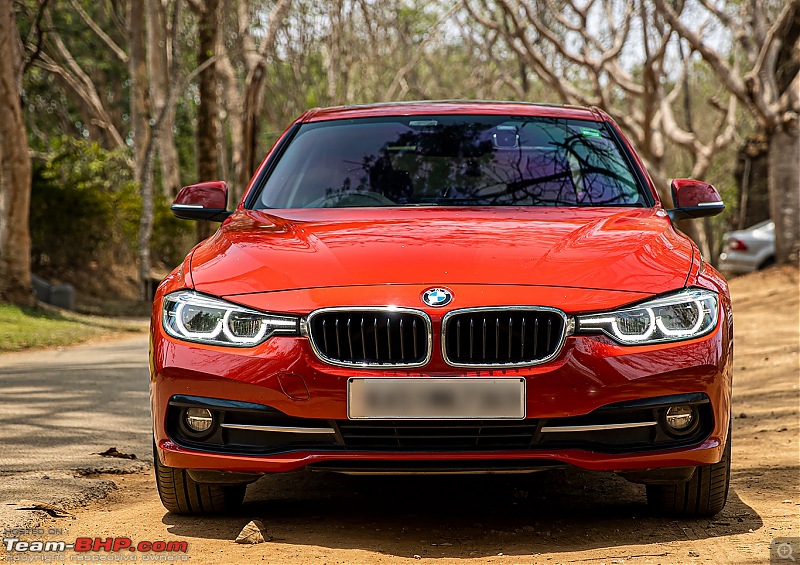 A shot of both cars together, by Robi: 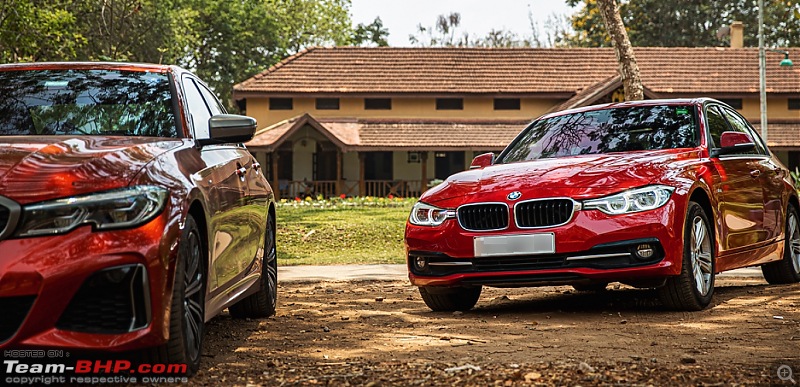 And now the roles are reversed. This is me shooting side view of Robi's car: 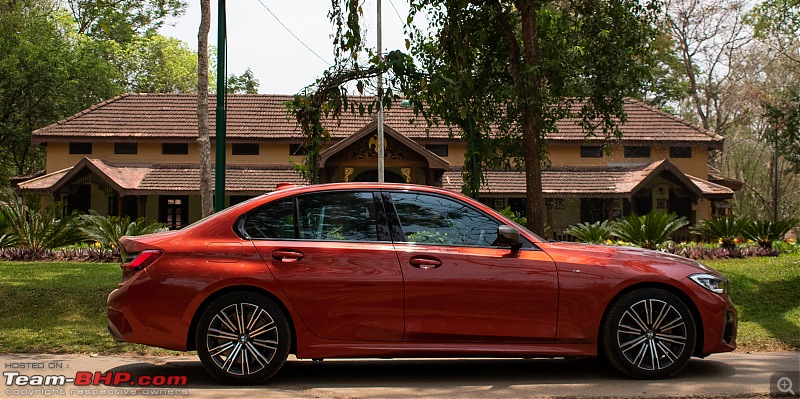 The two cars together: 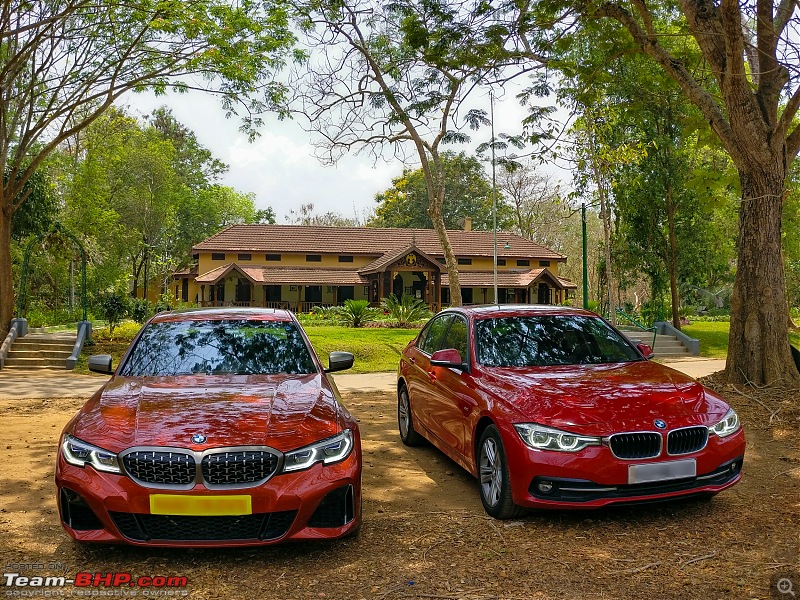 There was this lovely tree blossomed with pink flowers: 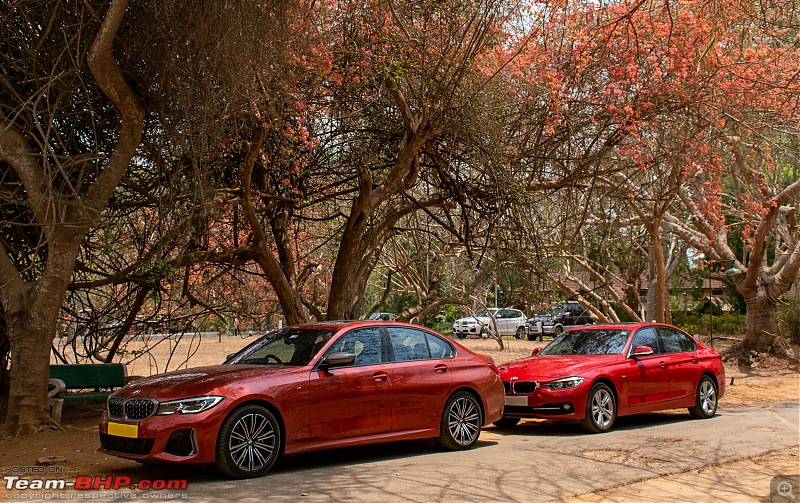 Where we parked our cars and took some photos: 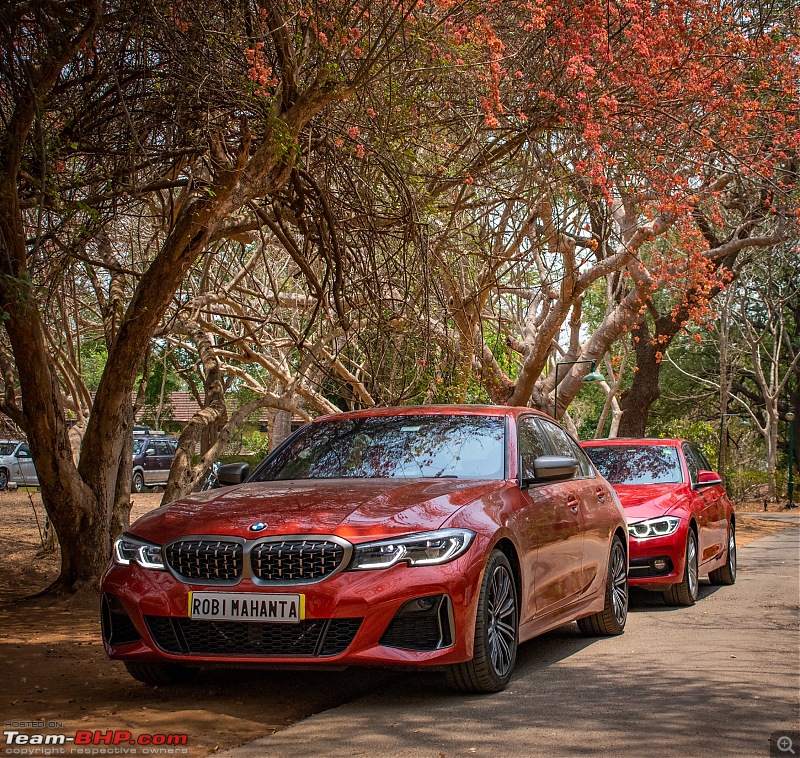 My shot of Robi's car under that tree: 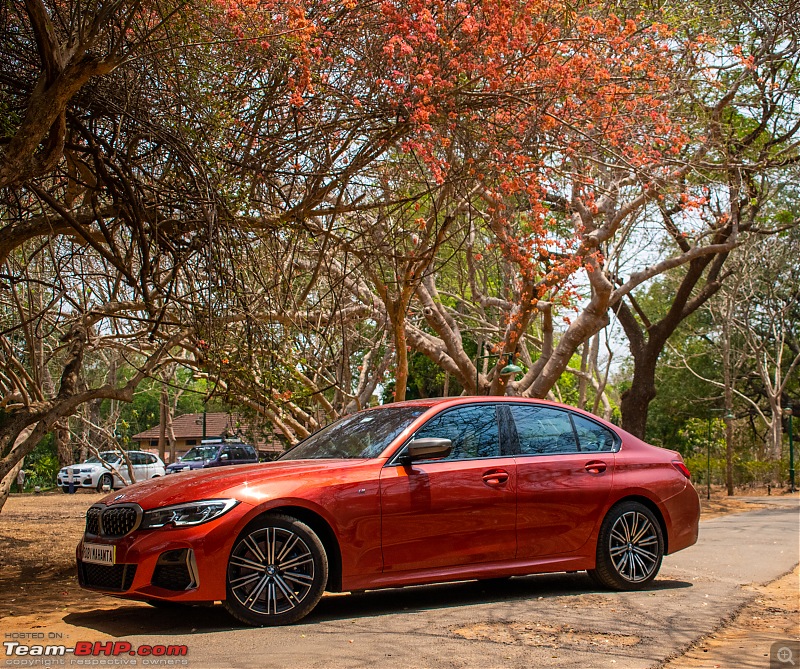 To break the monotony of red and orange, let us have some white! Jayanth was driving a beautiful Land Rover Discovery Sport in white, and I did not miss an opportunity to take a few photos of that lovely machine! Jayanth's Discovery Sport looked great in that setting: 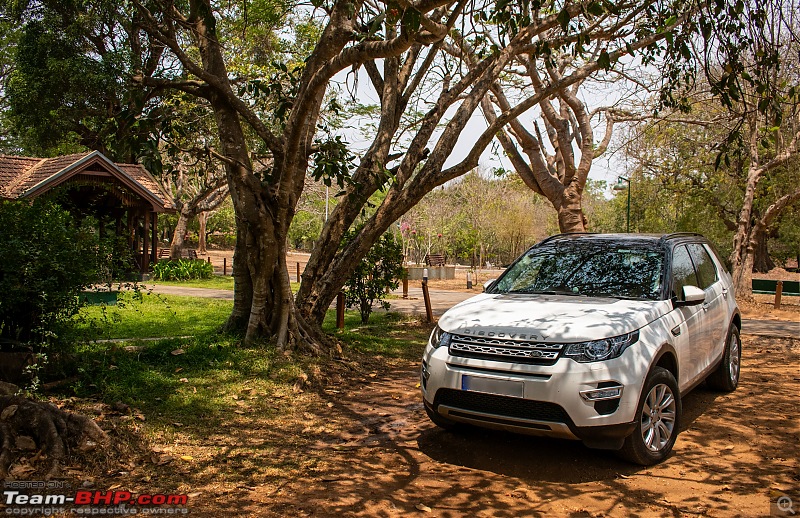 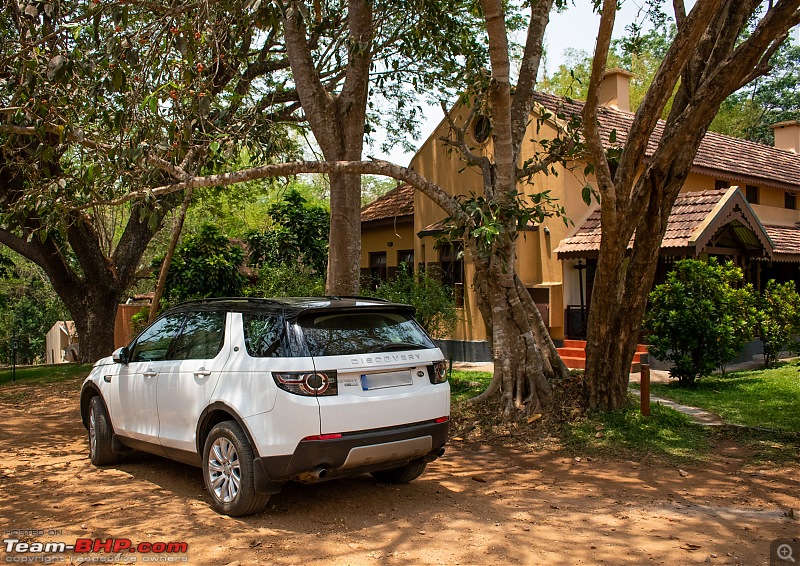 The two 3-ers parked together at the end of the photo session, with Robi walking away after parking: 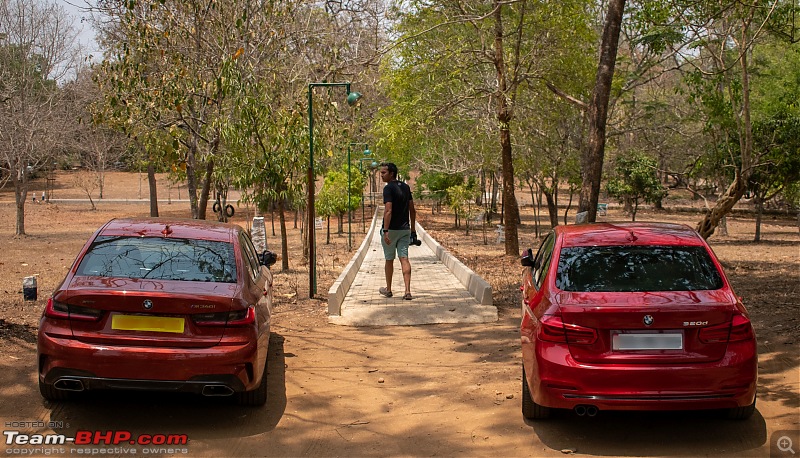 A parting shot of the two cars parked next to our cottages as got ready for the return drive: 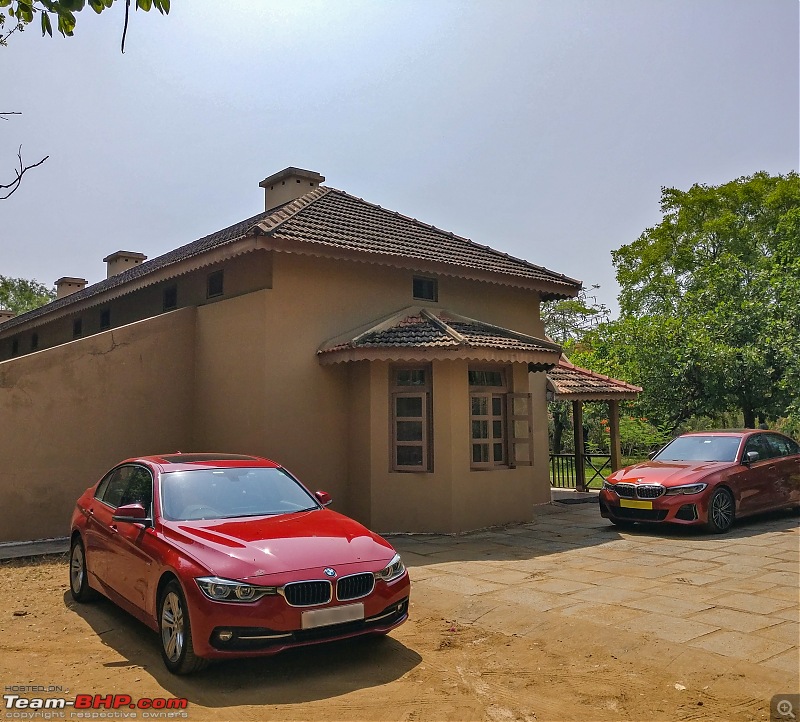 And finally, a customary shot of my car somewhere on the lovely roads between Kabini and Mysore, on the return leg: 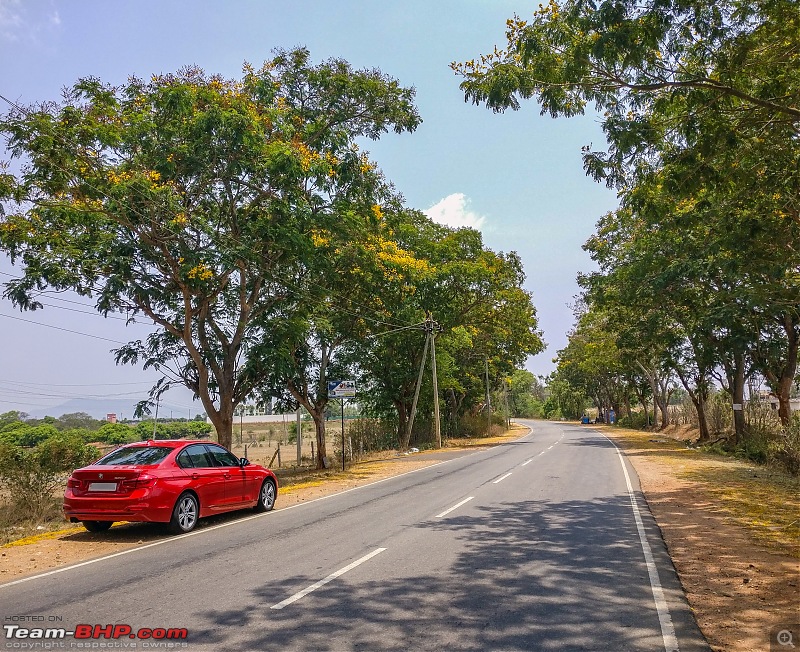 Last edited by Vid6639 : 4th April 2021 at 14:58. |
| |  (35)
Thanks (35)
Thanks
 |
| The following 35 BHPians Thank Dr.AD for this useful post: | Abhinav V, abirnale, akash_v12, amvj, arun_josie, batladanny, Bhalla, Bibendum90949, BlackPearl, CEF_Beasts, FlashMustang, fluidicjoy, Gannu_1, GTO, g_sanjib, haisaikat, InControl, karan561, KarthikK, megazoid, paragsachania, PearlJam, Philomath55, PioneerNB, procrj, R2D2, rahulananda, RBalaM, SnS_12, Thermodynamics, vb-saan, Venkygupta, vredesbyrd, yd_gli, ysjoy |
| | #6 |
| Distinguished - BHPian  Join Date: Apr 2010 Location: Bangalore/Pune
Posts: 1,913
Thanked: 20,649 Times
| Re: Cars, Wildlife and Photography Lessons at Kabini What did I Learn?It was undoubtedly a great experience for me to spend two days with experts like Jayanth and Robi, and not only discuss photography with them, but actually watch them shoot photos and compare my photos with them. I think I learnt a lot from them. Let me share some of my learnings here. I would also welcome fellow members to comment about their observations and we could have a healthy photography discussion that would help not only me but also others like be to become better at this art. I am not going to discuss the technical aspects like exposure triangle, aperture settings and depth of field, autofocus modes etc. That is actually the easy part and there is plenty of reading material on internet about that. I had already taken a few online courses and had a decent knowledge about various technical aspects and settings. Jayanth did give me a couple of very good tips about when to use Auto-Exposure Lock (AE/L) settings, and also explained to me why I should use AF-C (Continuous Auto Focus) instead of AF-S (AutoFocus Single) setting that I was used to using for most of my photos. These discussions were to the point and definitely helpful for me. However, what was much more important (and something that one can not learn by reading on the internet) was what I learned through observations and by seeing how Jayanth and Robi shoot the same scenes that I shot. This was for me the biggest experience of this trip. Below is a list of some of the practical (keeping aide the technical things) things I learnt through observations and discussions. 1. Each shot deserves appropriate settings for that shot. In other words, do not forget to quickly reassess the settings for each shot. I have a bad habit of setting the camera for a particular shot, and then forgetting what I did and taking a few more shots in the same old settings. I often get lot of images with wrong settings because I forgot to change them. Let me explain this through an example. Let us compare my tiger photo with Jayanth's photo of the same view that he published on his Instagram. Below photograph is taken by me: 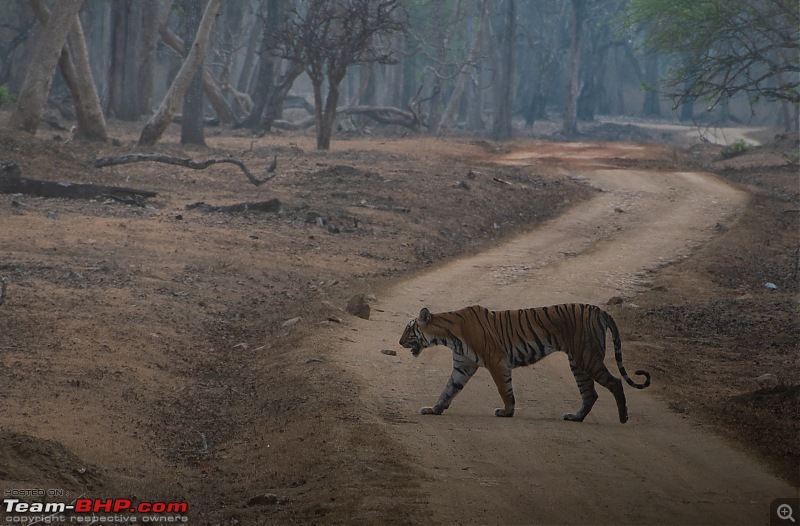 And this is Jayanth's photo of the same scene that he published on his Instagram (Source & Credit : https://www.instagram.com/p/CNHJX0WMmnR/) 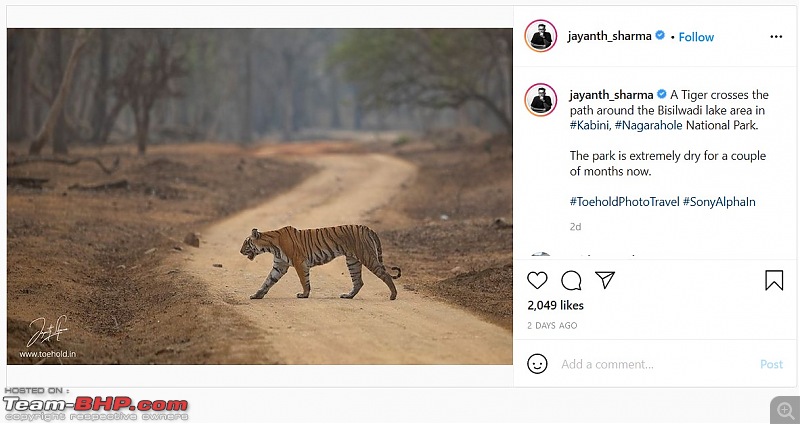 It is obvious that his photo is brighter and clearer than my photo. Obviously, he had much better equipment, and that did play a role. But keeping aside the equipment, what did I do wrong? When I was discussing this with Jayanth that night, he checked the aperture setting for my image and we were shocked to see it was f/9.0. Even my basic lens can open wide upto f/6.3 even at 300mm. A wider aperture would have given me a much brighter and clearer image. So why did I use such a low aperture? Because I forgot to change it from the previous setting. The tiger came out quite unexpectedly and in that excitement, I did a rookie mistake of not checking the camera settings and just shooting with whatever settings the camera was left on. A bad mistake and lesson learnt! 2. Framing and Compositions can make or break an image. Both Jayanth and Robi have an amazing sense of composition and framing. In every picture, they chose a frame which made the picture look so much better than mine. Again, let us look at an example. This is my photograph of the elephant eating leaves: 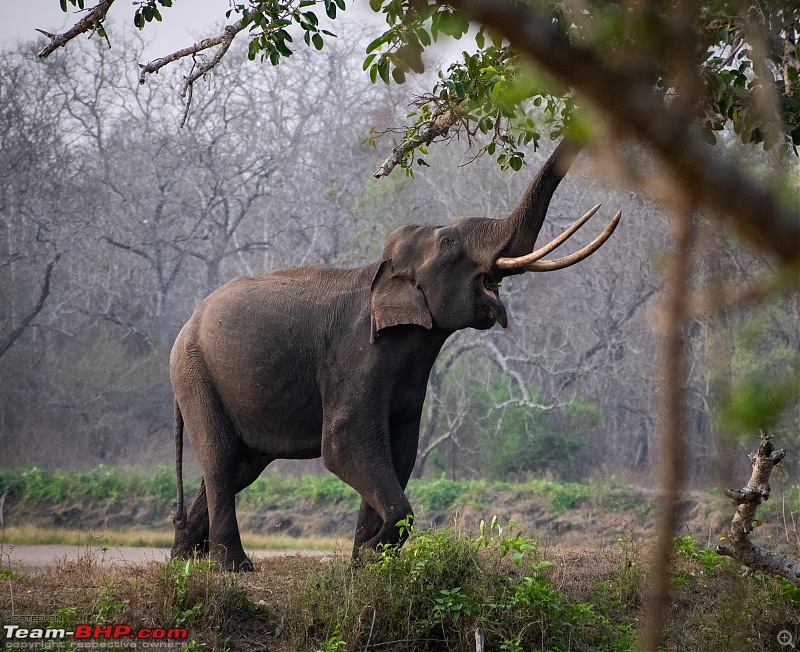 And then the photo of the same scene taken by Jayanth (Source & Credit: https://www.instagram.com/p/CNC5uxIr1GL/ ) 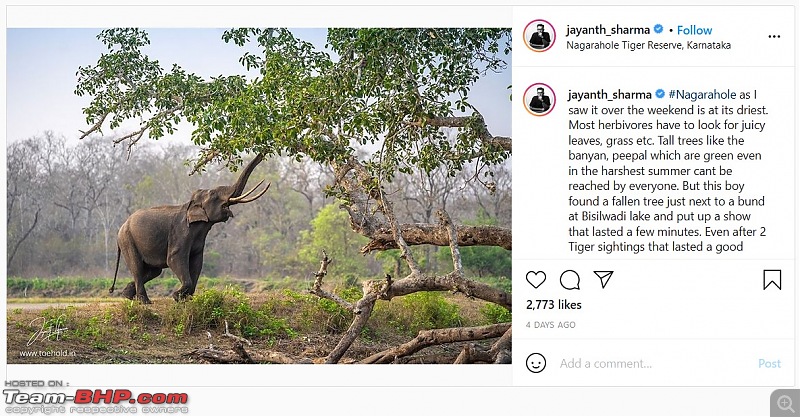 His photograph looks so much more appealing because of the frame. That wider shot with the tree in the picture gives a great context and balance to the image. The viewer can imagine the whole scene and the scene become unique. On the contrary, I zoomed in a bit too much on the elephant and now my elephant looks like any other elephant. The context is missing. Actually I did take another photo with such wider angle, but then in that case I got the depth of field wrong. I still focused only on the elephant and the tree went out of focus. It is important to have both the composition and focus to be absolutely spot on! Another lesson learnt. 3. Timing is everything: Wildlife scenes are always dynamic scenes (unlike landscapes and parked cars which do not move), and timing of the photo is very crucial. Half a second of timing difference could make or break the image. Again, let us look at an example: Indian Roller eating a lizard, as shot by me: 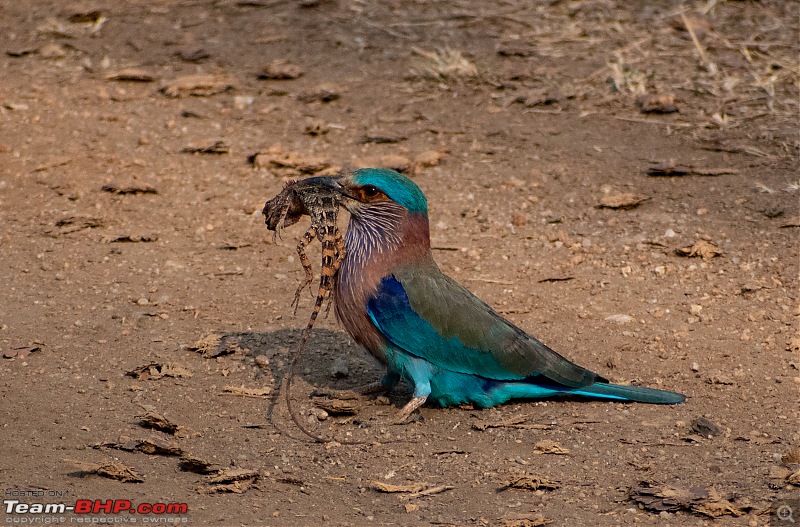 And the same scene shot by Jayanth (Source & Credit : https://www.instagram.com/p/CNEP_R4n_Hp/ ) 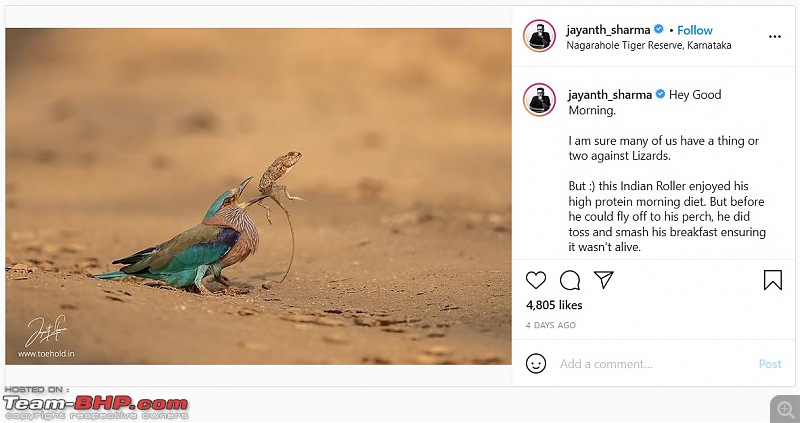 The difference in timing (among many other things) is obvious. I took many shots of that scene too, but in none of the shots I got the precise timing when the Indian Roller threw the lizard up in the air, like what Jayanth captured. The timing in my image makes it look dull, boring and static. Jayanth's timing captures the action and the drama that is totally missing in my image. Of course, in this particular image there are so many other technical differences too which make Jayanth's image so much better than mine. But keeping aside the technical differences, just the timing difference is stark! One more lesson learnt! 4. Every picture is not an art. This is something I learnt from Robi through our numerous discussions on this topic. Just because I got a tiger clearly in the frame, it does not become a good photo. There is much more to that. "For best photo, the animal has to look at you. The eye contact is very critical". This is one the things Robi told me many times. Then I started searching through my shots and started looking for eye contact. "Best images are when the four legs of the tiger are spread apart, like in a stride. Else it looks awkward" Another tip that Robi gave. Of course, not every tip is always applicable, but such discussions were great for me to get a bit more understanding about good wildlife photography. For example, my below picture, which I did not include in the travelogue above, is a good example of a bad art. "This is a good photo just to show the tiger. But this has no artistic value" - Robi's assessment of this picture: 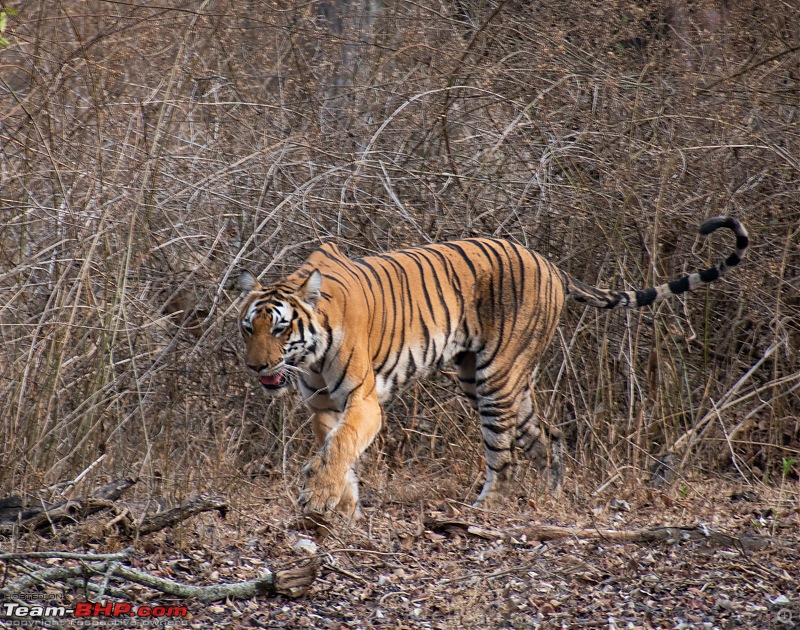 I completely agree with his assessment. Another lesson learnt about composition, pose, and the differences between picture and art. There were many such moments where just some casual remarks by Jayanth and Robi taught me a lot about photography. I am really thankful to both of them for what they taught me, both directly and indirectly! 5. I could get some decent shots even with a basic camera and lens. At no point Robi or Jayanth stressed on the camera specifications. It is possible to get decent pictures with a basic camera too. Did I get any good shots? I think so. The main shot I put at the top of the travelogue is pretty decent (at least by my standards) and I am happy about a couple of other photos too. Going forward, I am not going to chase gear (yet) but chase the art and try to learn as much as I can on my camera before thinking of any upgrades. With that note, let me conclude this travelogue. All I can say is I can't wait to go back out there somewhere and practice the art again. Hope I get another opportunity soon. I request Robi (@robimahanta) to share his photos, and maybe add his commentary too. That would make a great reading for others like me. Thank you for reading, and please feel free to share your comments and observations too. It would be great to have a photography discussion that would help us learn more! Last edited by Vid6639 : 4th April 2021 at 14:58. |
| |  (44)
Thanks (44)
Thanks
 |
| The following 44 BHPians Thank Dr.AD for this useful post: | Abhinav V, abirnale, akash_v12, amey_tade, AmitRavi07, arun_josie, Bhalla, Bibendum90949, BlackPearl, CEF_Beasts, CrazyToDrive, deepfreak15, fiat_tarun, FlashMustang, Gannu_1, graaja, GTO, g_sanjib, InControl, jkrishnakj, JoshMachine, karan561, KarthikK, mankuthimma, paragsachania, procrj, Pseud, R2D2, rahulananda, RBalaM, robimahanta, saikarthik, sainyamk95, SnS_12, sups, Thermodynamics, Turbanator, vb-saan, Vijin, Vik0728, vj_torqueaddict, vsrivatsa, yd_gli, ysjoy |
| | #7 |
| Distinguished - BHPian  Join Date: Aug 2009 Location: BLR/GAU
Posts: 879
Thanked: 8,372 Times
| An amazing write up AD. I relived the whole trip through your images. It is amazing how fast you picked up the finer nuances of nature photography and I guess there is hardly anything much for me to say which will add value. I had a prime telephoto lens and at times you need to plan your shots a lot more than when you have a zoom. Having said that the most common mistake when someone uses a telephoto zoom is that they tend to zoom in to its maximum for all images. Often at times less is more and the image looks better when you have some space all around. It gives a lot more context. This is an image of the beautiful tusker we saw late evening, a relatively wide perspective 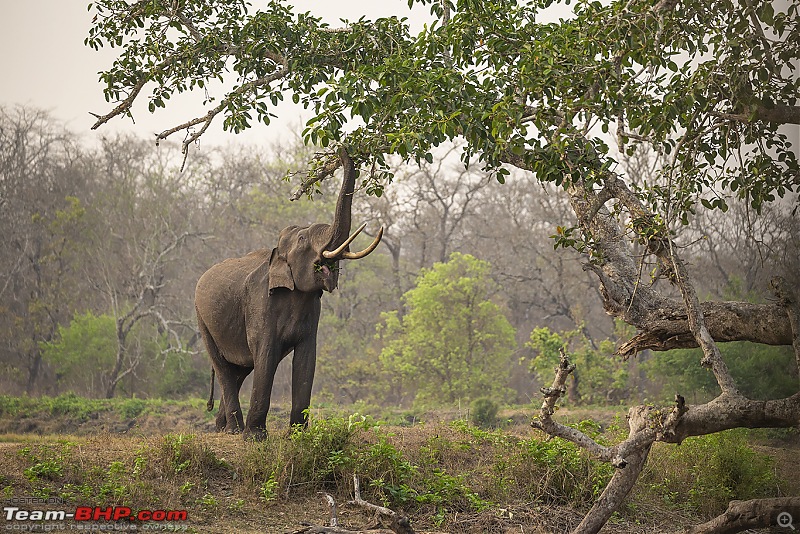 The problem of having a fixed telephoto lens, the image gets too tight 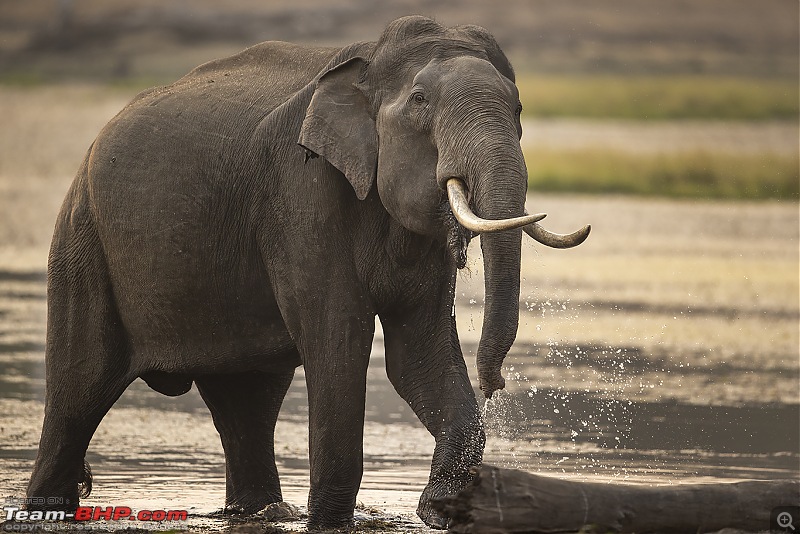 Even in this image I wish I had a wider perspective 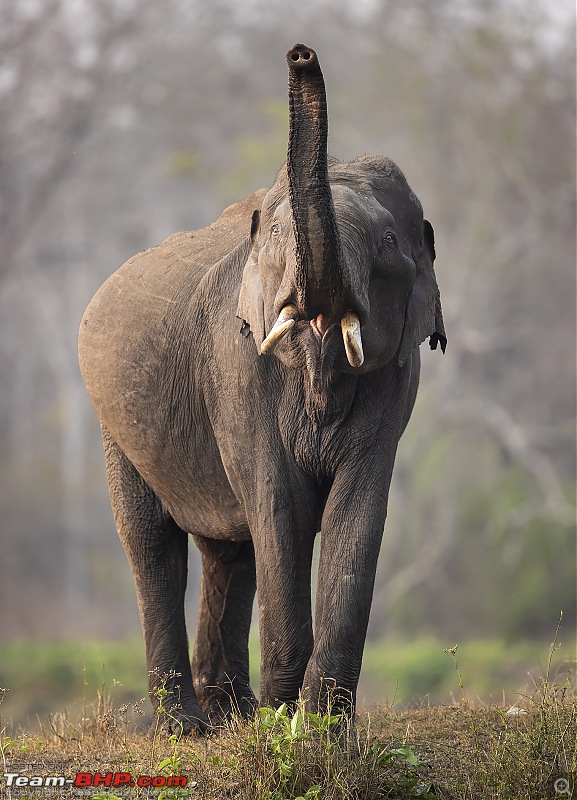 Another image of the same tusker showing a lot more detail 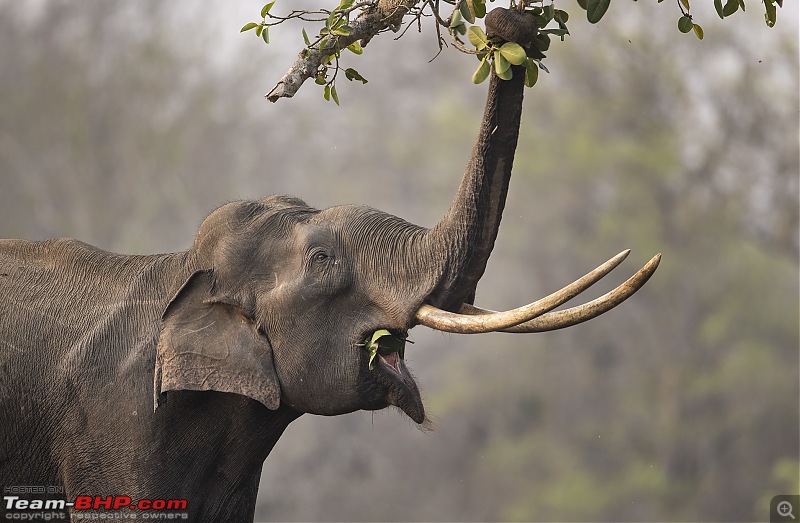 Flight of the Indian Roller, always tricky to nail focus. Anticipation is the key. However, the new mirrorless camera AF systems have made it considerably easy. Hoping to move to a mirrorless system soon. 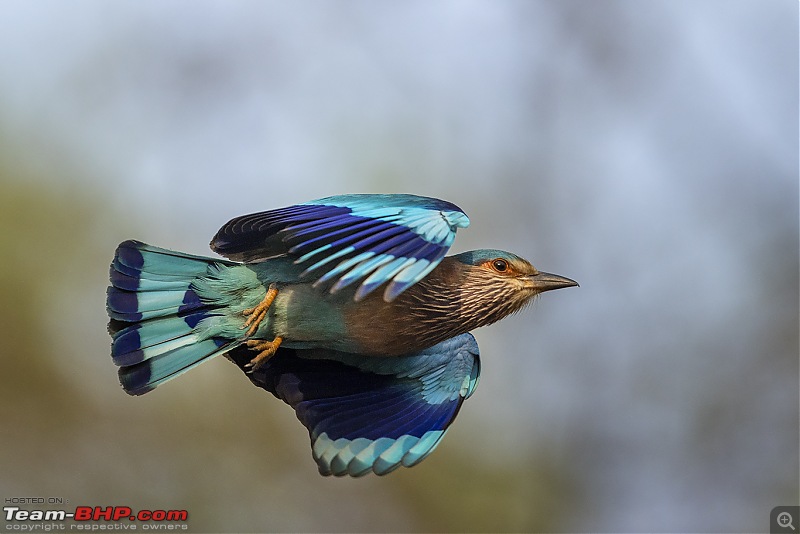 A peacock with some lovely bokeh, not everything is about the cats in a safari 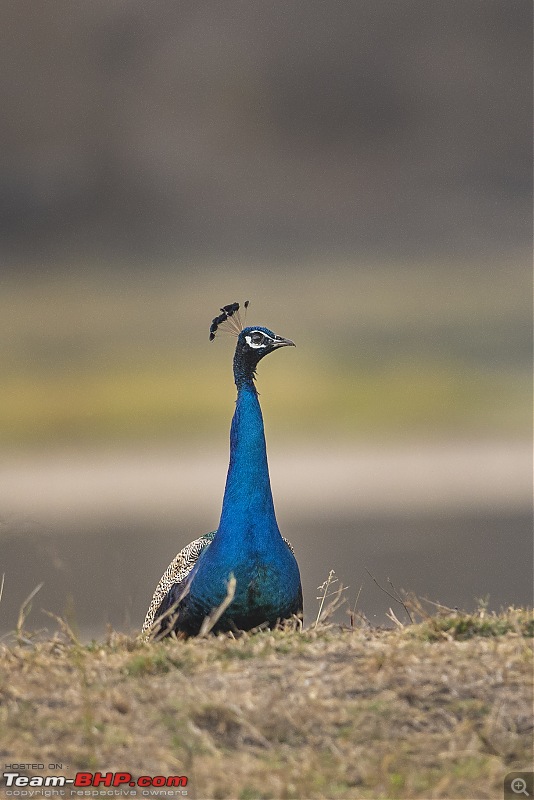 A malabar giant squirrel, again a tricky subject to get in focus and to compose 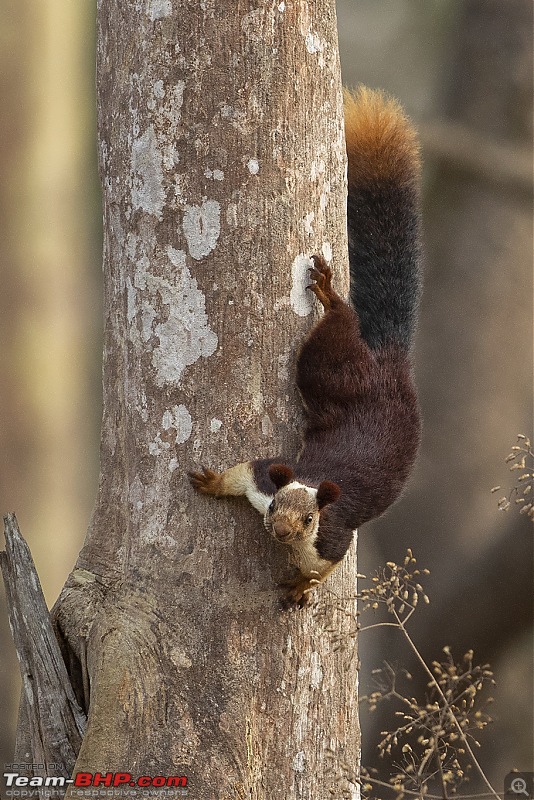 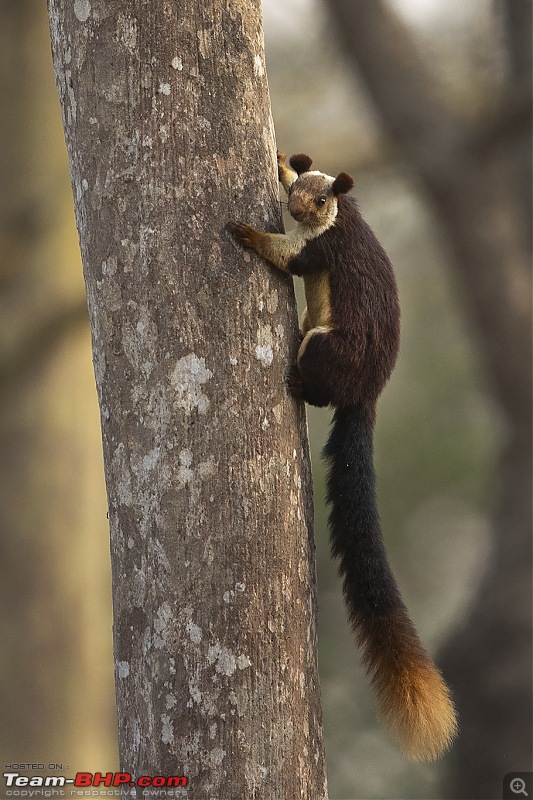 Coming to the cats, a leopard on a tree. It was quite far and we never really had a clear view. So did best with whatever we could manage. 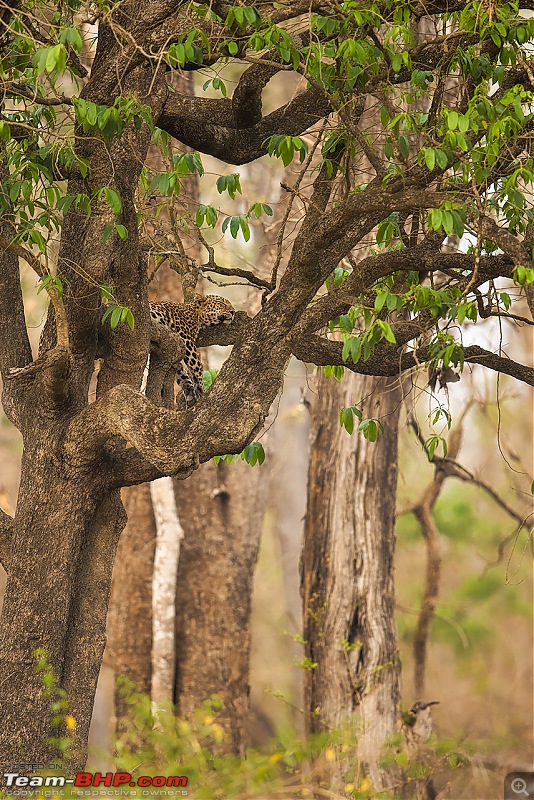 Trying both a vertical and horizontal crop 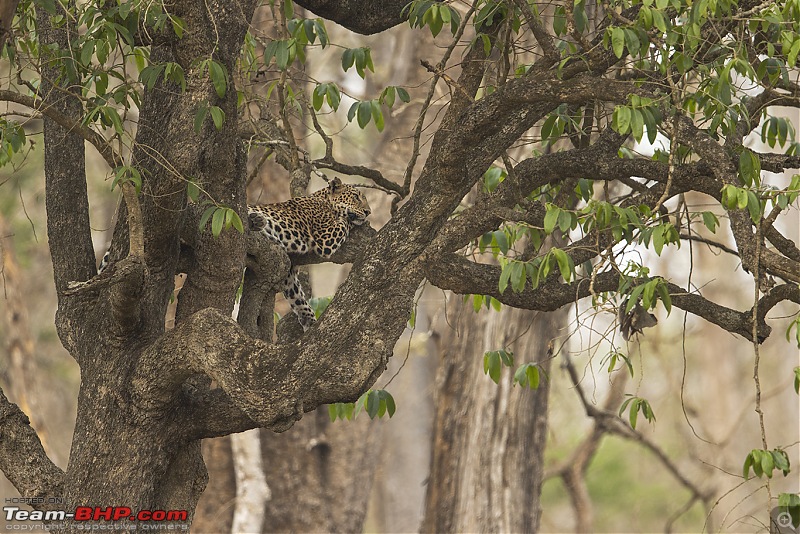 We saw two different tigers and one of them was pretty close 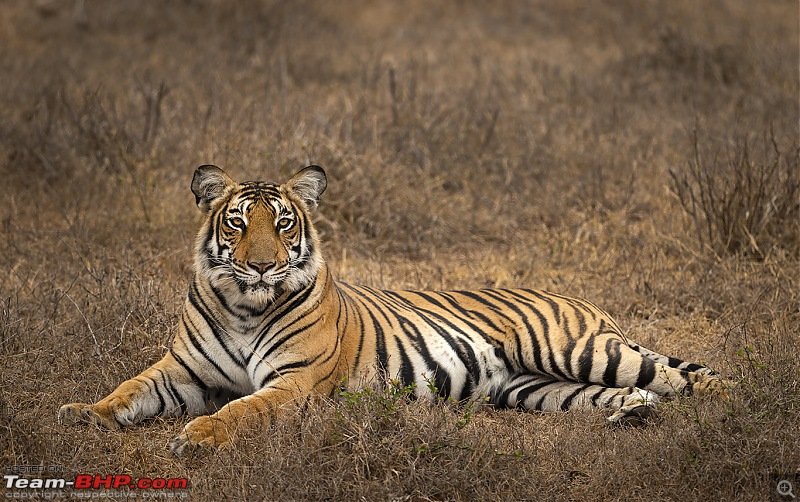 Eye contact is crucial especially for close ups 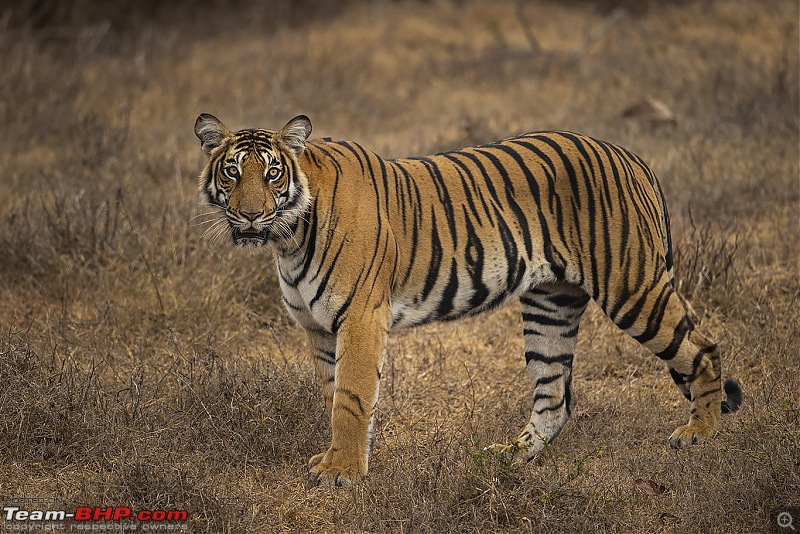 As it climbed on to level ground from a water hole 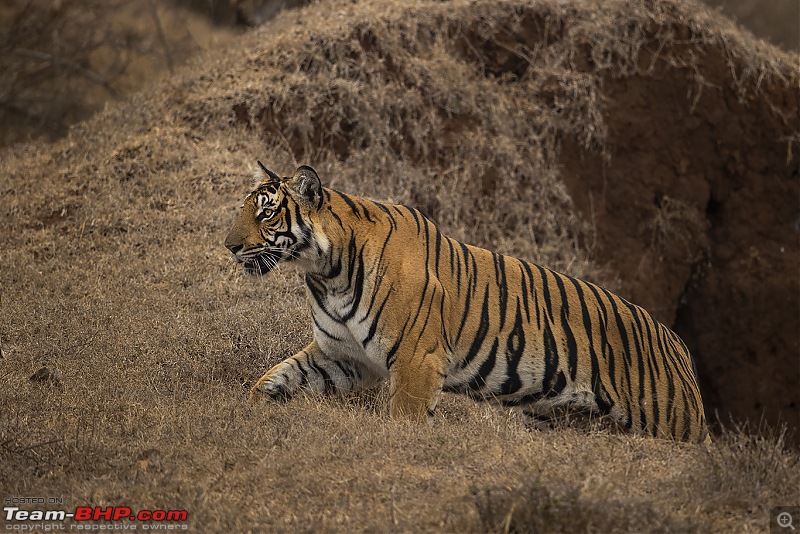 A slightly wider perspective, wish it turned its head but wildlife isn't a studio setup  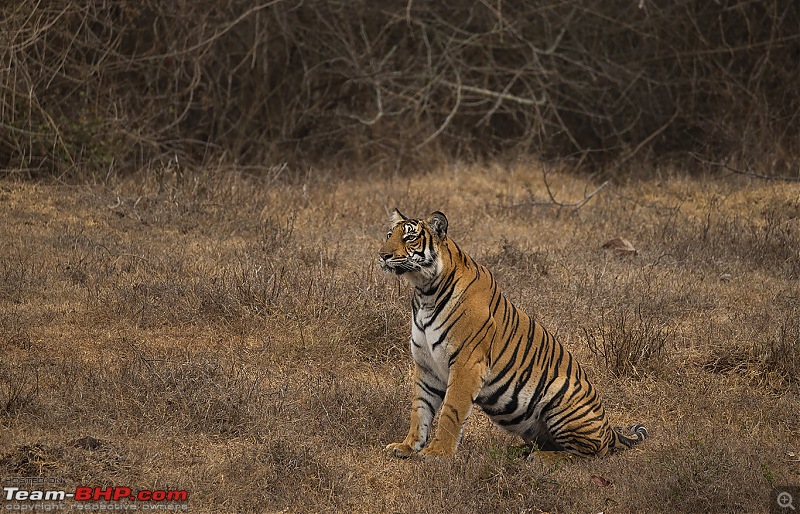 The other tiger sighting. This particular tiger never looked at us and just went in the forest crossing the track in front of us. 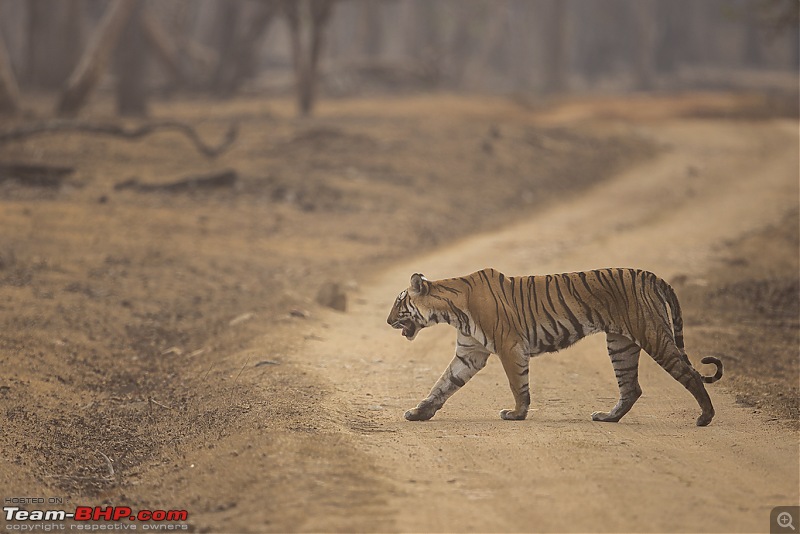 Just before it disappeared in the thicket 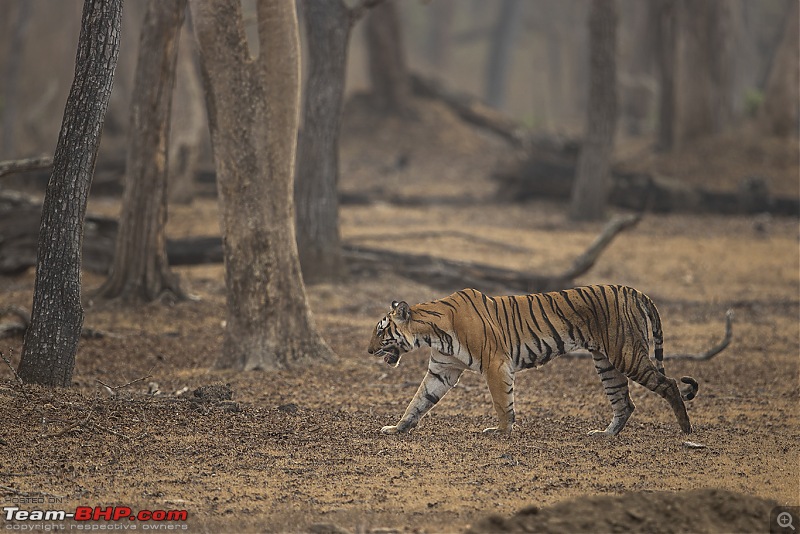 I am so glad AD took many images of the forest as well. Often at time we are so engrossed in looking for tigers and leopards that we tend to forget so many other amazing picture opportunities. Also we tend to just fire away images just because its all digital that we tend to mis relishing the sights and sounds of nature. Often its a pain going through thousands of images and finding the right ones to edit/process. Majority of images just use up HDD space. Best is to shoot less but shoot relevant. Hopefully we can do many more photography trips together AD in the future. Last edited by Vid6639 : 4th April 2021 at 22:26. |
| |  (50)
Thanks (50)
Thanks
 |
| The following 50 BHPians Thank robimahanta for this useful post: | abirnale, akash_v12, amey_tade, AmitRavi07, amvj, animeshc, anumod, arun_josie, Bhalla, Bibendum90949, BlackPearl, CEF_Beasts, dailydriver, deepfreak15, Dr.AD, Fateh Salim, fluidicjoy, Gamerk, Gannu_1, graaja, GTO, g_sanjib, Harsha89, jayakumarkp, karan561, KarthikK, megazoid, paragsachania, PearlJam, procrj, Pseud, R2D2, RBalaM, RJ2285, saikarthik, sainyamk95, sgm, sknair, SnS_12, sups, TurboGuy, varunanb, vb-saan, Venkygupta, Vijin, viXit, vredesbyrd, vsrivatsa, yd_gli, ysjoy |
| | #8 |
| Team-BHP Support  | Re: Cars, Wildlife and Photography Lessons at Kabini Thread moved out from the Assembly Line. Thanks for sharing! |
| |  (5)
Thanks (5)
Thanks
 |
| The following 5 BHPians Thank Vid6639 for this useful post: | Dr.AD, Gamerk, GTO, KarthikK, vb-saan |
| | #9 |
| Senior - BHPian Join Date: Jan 2013 Location: Pune
Posts: 1,252
Thanked: 6,138 Times
| Re: Cars, Wildlife and Photography Lessons at Kabini Wow! Some amazing shots there, Dr.! Not only are your “captures” great, but your humble and straight-from-the-heart rendering of lessons at the end, make them seem magical when I look at them from the start again.  |
| |  (3)
Thanks (3)
Thanks
 |
| The following 3 BHPians Thank JoshMachine for this useful post: | Dr.AD, FlashMustang, KarthikK |
| | #10 |
| Senior - BHPian Join Date: Apr 2010 Location: Bangalore
Posts: 1,688
Thanked: 4,404 Times
| Re: Cars, Wildlife and Photography Lessons at Kabini Beautiful read. Excellent clicks. Nice narrative with an easy flow. The last few ‘Lessons’ with the comparative other clicks is very educative. I’m no expert and use mostly a point and shoot with Auto focus. For me, these were like wow! Feel like taking a crash course on photography and working on it. |
| |  (3)
Thanks (3)
Thanks
 |
| The following 3 BHPians Thank jkrishnakj for this useful post: | Dr.AD, FlashMustang, vj_torqueaddict |
| | #11 |
| BHPian Join Date: Jul 2014 Location: Noida
Posts: 118
Thanked: 467 Times
| Re: Cars, Wildlife and Photography Lessons at Kabini Great trip and a great write-up, Dr! Wonderful sightings too! Concur with you on the route from Bangalore to Mysore through Belur Cross. Drove through this route last October for our visit to Ooty, and it was a pleasure to drive. Great road conditions and beautiful scenery. Absolutely loved your nature, wildlife and car photographs! They were all a beauty! Thanks for compiling and sharing the tips for photography. Keep your travelogues coming! Happy travels! |
| |  (1)
Thanks (1)
Thanks
 |
| The following BHPian Thanks FlashMustang for this useful post: | Dr.AD |
| |
| | #12 | ||||
| Distinguished - BHPian  Join Date: Apr 2010 Location: Bangalore/Pune
Posts: 1,913
Thanked: 20,649 Times
| Re: Cars, Wildlife and Photography Lessons at Kabini Quote:
Quote:
Quote:
Quote:
| ||||
| |  (3)
Thanks (3)
Thanks
 |
| The following 3 BHPians Thank Dr.AD for this useful post: | FlashMustang, jkrishnakj, KarthikK |
| | #13 | |
| Senior - BHPian Join Date: Apr 2010 Location: Bangalore
Posts: 1,688
Thanked: 4,404 Times
| Re: Cars, Wildlife and Photography Lessons at Kabini Quote:
OT: The JLR at Kabini is perhaps the most expensive. Anyone knows if other properties around there also organise safaris? For example, I saw some great rates at the Serai but they have no mention of the safari. | |
| |  (2)
Thanks (2)
Thanks
 |
| The following 2 BHPians Thank jkrishnakj for this useful post: | Dr.AD, FlashMustang |
| | #14 | ||
| Distinguished - BHPian  Join Date: Apr 2010 Location: Bangalore/Pune
Posts: 1,913
Thanked: 20,649 Times
| Re: Cars, Wildlife and Photography Lessons at Kabini Quote:
https://www.udemy.com/course/photogr...o-photography/ The course fee is just about Rs. 500 (they have similar deals all the time), and it is absolutely worth it. 23 hours of video classes and then lots of practical assignments. This is one comprehensive course that I would recommend to anyone! Quote:
| ||
| |  (2)
Thanks (2)
Thanks
 |
| The following 2 BHPians Thank Dr.AD for this useful post: | FlashMustang, jkrishnakj |
| | #15 | |
| Senior - BHPian Join Date: Oct 2020 Location: Magic land
Posts: 1,057
Thanked: 4,429 Times
| Re: Cars, Wildlife and Photography Lessons at Kabini Beautiful thread with beautiful pictures  . The snaps of the animals are brilliant and they do stand out. . The snaps of the animals are brilliant and they do stand out. Quote:
| |
| |  (1)
Thanks (1)
Thanks
 |
| The following BHPian Thanks TrackDay for this useful post: | Dr.AD |
 |


